Dear Investor,
We wanted to share our perspective on the latest IPO of Tata Technology. Provided below is a summary of our view. For a more detailed overview please check the document attached.

About the IPO:
It is entirely an Offer for Sale (OFS) and the company will not receive any proceeds from the issue. This gives the retail investor an opportunity to own the company’s shares in the public markets without any dilution at listing.
IPO includes the sale of up to 6.08 crore equity shares, which accounts for 15% of the company’s paid-up share capital. All promoters are only partially selling their stake. Tata Motors to divest 11.41% stake, Alpha TC Holdings to divest 2.4%, and Tata Capital Growth Fund I to divest 1.2%.
10% of the issue size (1.5% of shareholding) is reserved for shareholders and employees of Tata Motors. Still significant room for other retail, HNI investors.
About the Company:
Tata Technologies offers high-end technology solutions. The company has four core services that are Engineering, Research and Development (ER&D), digital enterprise services, education offerings, and product and value-added reselling.
Our Opinion on Valuations:
At the higher price of the IPO band of Rs. 500, the company is being valued at a PE of 58x. This multiple is a modest discount to the 66x PE ratio at which its closest peer, Tata Elxsi, currently trades.
With the growth prospects, strong margin expansion opportunities, and a strong management team, we recommend subscribing to the IPO.
We recommend subscribing to the Tata Technologies IPO at the highest price band of Rs. 500 per share to ensure allotment. Furthermore, we recommend holding the stock as a long-term investment. Currently, the IT sector is facing headwinds and there is a chance that listing gains may not be significant, as a result, be cautious while applying for the IPO only from a short-term holding standpoint and only for listing gains.
As per our internal valuation metrics, we expect some listing gains for the company and a potential upside of 30% in the coming two years. In our humble opinion, the real game for investors is patient investing. If an investor decides to hold on to the shares of Tata Technologies for the coming 5 years, we expect an upside of 85% or a CAGR (compounded annual growth rate) of 15% plus for the patient investor.
Tata Technologies IPO Note_November 21, 2023
Regards,
Suruchi Jain
Managing Director and Founder
Opportune Wealth Advisors Private Limited
Investment Adviser (SEBI – INA000005366)
Check our website: | www.opportunewealth.com | Disclosures
Mobile: +91-98202-33523
Report Published on 21st November 2023.
Copyright Opportune Wealth Advisors Private Limited (herein named “Opportune”). All Rights Reserved. Opportune is registered with SEBI as an investment adviser (registration number INA000005366). Opportune has not been the subject of any disciplinary action by SEBI and has no associate or group company. The information and opinions given here may include Opportune’s confidential and proprietary information, are not warranted to be complete or accurate, should not be copied or distributed without Opportune’s prior written consent, and are not to be regarded as an offer to buy or sell any particular security. Please note that the information and opinions given here are not intended to constitute legal, tax or financial advice; so, before making any investment decision in any security, please consult your legal/tax/financial consultant and read the underlying documents, as applicable, including the risk factors involved in investing in the security. Opportune, its directors and employees shall not be responsible for any trading decisions, damages or other losses that may be incurred by anyone consequent to relying upon the information and opinions given here. Investments in securities are subject to market risks and there is no assurance or guarantee that the intended investment objectives will be achieved. Past performance may or may not be sustained in future and is no indication of future performance. The price/value/interest rates of securities and mutual fund schemes fluctuates, therefore, the value of investors’ investments in stocks / mutual fund schemes and the income derived from them may go up or down. The terms and conditions on which Opportune offers advisory services to clients vary from client to client and are spelt out in the respective client agreement. Opportune and its clients, employees, Directors may have vested interest in the securities mentioned in this research document. Please use your best judgment on making decisions pertaining to your individual investments. Registration granted by SEBI, membership of BASL and certification from NISM in no way guarantee performance of the intermediary or provide any assurance of returns to investors.Investment in the securities market are subject to market risks. Read all the related documents carefully before investing.
Dear Investor,
India’s luxury landscape is undergoing a fascinating evolution, becoming a thriving hub of sophistication and extravagance. This transformation is propelled by shifting consumer preferences and steadily rising disposable incomes. In this newsletter, we embark on a journey to uncover the reasons behind India’s flourishing luxury market and explore the latest trends that shape it.
The Indian Luxury Industry: A Bright Future Ahead
The Indian luxury industry encompasses a wide array of segments, from luxury cars and upscale hospitality to personal luxury goods like high-end fashion, exquisite jewelry, and premium beauty products. Luxury cars, hospitality, and personal luxury goods together constitute over 80% of India’s luxury market, with fine wines, gourmet food, homeware, and private jets making up the rest.
What’s truly exciting is that India’s luxury market is on the brink of exponential growth, projected to expand 3.5 times the current market size, reaching an impressive $200 billion by 2030.
In the realm of travel and tourism, India is experiencing steady growth, with revenue expected to reach $18.91 billion in 2023. This upward trend is projected to continue, reaching a market volume of $31.35 billion by 2027. India’s rich culture, heritage, natural beauty, and spirituality make it a sought-after destination for travelers, offering luxurious options from palace hotels to wildlife safaris.
In the world of luxury cars, SUVs dominate the Indian market, accounting for over 50% of sales in the current year. The demand for electric vehicles is rising. The high-net-worth-individual (HNI) population, with assets exceeding $1 million, is set to double from 7.9 lakh individuals in 2022 to 16.5 lakh by 2027, indicating substantial growth potential for luxury cars in India.
Luxury retail saw substantial growth in 2023, with an 11% increase in sales, reaching $3.2billion (INR 256.2 billion). Industry leaders like LVMH, Louis Vuitton, and Hermès were major contributors to this surge, driven by investments in high-end jewelry and premium eyewear.
As the festive season approaches, numerous luxury brands are entering the Indian market to cater to the rising affluence of Indians, even in smaller towns. Factors such as exposure to global fashion trends, the younger demographic’s interest in luxury, and post-pandemic economic recovery fueled this trend. Western luxury brands like Gucci, Cartier, Burberry, Christian Dior, and others have secured retail spaces in Reliance’s new mall in Mumbai.
Several key factors driving the growth of India’s luxury industry:
- Rise in HNIs and UHNWIs: 6India’s ultra-high-net-worth individuals (UHNIs) with net worth exceeding $30 million are set to increase by over 58.4% in the next five years.
- Entrepreneurship: A thriving startup ecosystem in India is fueling the demand for luxury goods and services, thanks to dynamic young entrepreneurs.
- Per Capita Income as Key Luxury Drivers: 7India’s per capita income is on the rise, projected to reach $4,000 by 2030, empowering more Indians to indulge in luxury purchases.
In a spectacular fusion of global luxury and Indian tradition, some of the world’s most renowned luxury brands have made their mark in India’s vibrant market with exclusive launches that cater to the tastes and preferences of Indian consumers. Recently, Italian luxury brand Bvlgari launched mangalsutra exclusively for the Indian Market. Swiss Watchmaker Franck Muller introduced 150 pieces of limited edition time-pieces on India’s 75th year of Independence. Louis Vuitton launched at limited edition capsule collection of footwear priced between ₹75,000 to ₹1.2 lakh to target the wedding season in India.
Opportune Wealth’s® Take:
As we stand on the cusp of a remarkable transformation in India’s luxury sector, we’re thrilled to be part of a story that’s just getting started. Allocating 15-20% of our portfolio to this dynamic industry reflects our unwavering belief in its limitless potential.
Written by Krupa Shah (Advisor),
Supervised by Suruchi Jain (Principal Advisor)
Sources:
- https://www.cnbctv18.com/lifestyle/india-luxury-market-worth-200-billion-dollars-by-2030-16619841.htm
- https://www.entrepreneur.com/en-in/news-and-trends/is-india-ready-for-luxury-products/453208#:~:text=As%20per%20Bain%20and%20Company,%24200%20Bn%20mark%20by%202030.
- https://www.statista.com/outlook/mmo/travel-tourism/india
- https://www.fortuneindia.com/long-reads/the-rich-club-set-to-get-bigger/114001#:~:text=The%20Indian%20high%20net%20worth,from%207.9%20lakh%20in%202022.
- https://www.euromonitor.com/search?term=luxury+India+2023
- https://www.livemint.com/news/india/india-to-have-16-lakh-hnis-by-2027-knight-frank-report-11684332782881.html
- https://indbiz.gov.in/indias-per-capita-income-to-grow-by-nearly-70-by-2030-report/#:~:text=India’s%20per%20capita%20income%20is,report%20from%20Standard%20Chartered%20Bank

Regards,
Suruchi Jain
Managing Director and Founder
Opportune Wealth Advisors Private Limited
Investment Adviser (SEBI – INA000005366)
Check our website: | www.opportunewealth.com | Disclosures
Copyright Opportune Wealth Advisors Private Limited (herein named “Opportune”). All Rights Reserved. Opportune is registered with SEBI as an investment adviser (registration number INA000005366). Opportune has not been the subject of any disciplinary action by SEBI and has no associate or group company. The information and opinions given here may include Opportune’s confidential and proprietary information, are not warranted to be complete or accurate, should not be copied or distributed without Opportune’s prior written consent, and are not to be regarded as an offer to buy or sell any particular security. Please note that the information and opinions given here are not intended to constitute legal, tax or financial advice; so, before making any investment decision in any security, please consult your legal/tax/financial consultant and read the underlying documents, as applicable, including the risk factors involved in investing in the security. Opportune, its directors and employees shall not be responsible for any trading decisions, damages or other losses that may be incurred by anyone consequent to relying upon the information and opinions given here. Investments in securities are subject to market risks and there is no assurance or guarantee that the intended investment objectives will be achieved. Past performance may or may not be sustained in future and is no indication of future performance. The price/value/interest rates of securities and mutual fund schemes fluctuates, therefore, the value of investors’ investments in stocks / mutual fund schemes and the income derived from them may go up or down. The terms and conditions on which Opportune offers advisory services to clients vary from client to client and are spelt out in the respective client agreement. Opportune and its clients, employees, Directors may have vested interest in the securities mentioned in this research document. Please use your best judgment on making decisions pertaining to your individual investments. Registration granted by SEBI, membership of BASL and certification from NISM in no way guarantee performance of the intermediary or provide any assurance of returns to investors.Investment in the securities market are subject to market risks. Read all the related documents carefully before investing.
Dear Investor,
The IT industry has reached a significant milestone, culminating in the near completion of the Digitization era. Throughout the past few decades, businesses have revolutionized their operations by transitioning from manual processes to machines, digital systems. This journey harnessed the power of technology to streamline operations and enhance efficiency.
While we celebrate this achievement, we must now prepare ourselves for the next phase of technological advancement. Our focus now shifts towards embracing emerging technologies that have the potential to reshape industries in ways previously unimaginable. In this
newsletter, we will delve into some examples and trends that are shaping the future of technology.
From Digitization to Artificial Intelligence (AI)
For example, the recruitment process has evolved from physical resume screening to online platforms integrated with artificial intelligence (AI). AI-driven algorithms analyze vast amounts of data to match candidates with suitable job opportunities, leading to better hiring decisions and reduced time-to-hire. Research and data firm- Gartner predicts that by 2025, 75% of large enterprises will use AI-powered recruiting platforms .
Another is the automotive industry is experiencing disruption due to Electric Vehicles (EV) and autonomous driving technologies. EV sales surpassed 10 million units in 2022. Industry experts project global annual EV sales to reach 730 million units by 2040, with a CAGR of approximately 23%.
Other emerging areas of research and AI implementation include medicine. Here, large amounts of data can be used to predict and detect diseases at an early stage – especially useful for cancer and oncology treatment.
On a lighter note, while improving productivity and efficiency is an important aspect of using technology across multiple fields. Entertainment is not far behind. With video streaming platforms and audio-activated devices having better access to customer-specific information. The customized or tailor-made experience through recommendations and other features, is quite addictive. (Remember – this is how Amazon first started selling more products to the same customer). Fostering innovation is key to staying relevant to the customer and ahead of competition in this new era.
Opportune Wealth’s® take
As we celebrate the completion of the Digitization era in the IT industry, we must recognize the crucial role that Artificial Intelligence or AI will play moving ahead. In the future, we anticipate that companies will thrive with fewer employees yielding more revenue and greater profits, unlike today’s paradigm where more employees often equate to more revenue and profits.
Companies that wholeheartedly embrace these technological changes, invest significantly in research and development, and foster a culture of innovation are the ones that will undoubtedly succeed in this new era of transformation.
Written by Neelanchal Pasi (Research Associate),
Supervised by Suruchi Jain (Principal Advisor)
Sources:
- https://www.gartner.com/en/newsroom/press-releases/2021-05-19-gartner-says-70-percent-of-organizations-will-shift-their-focus-from-big-to-small-and-wide-data-by-2025
- https://about.bnef.com/electric-vehicle-outlook/
- https://www.researchandmarkets.com/reports/5546183/global-autonomous-vehicles-market-size
- https://www.ncbi.nlm.nih.gov/pmc/articles/PMC9864608/
- https://www.statista.com/outlook/amo/media/tv-video/ott-video/worldwide

Regards,
Managing Director and Founder
Opportune Wealth Advisors Private Limited
Investment Adviser (SEBI – INA000005366)
Check our website: | www.opportunewealth.com | Disclosures
Dear Investors,
Do you ever find yourself pondering over the magical essence that flavors your food, the icy secrets that keep your room cool, and the wizardry behind the relief brought by medicines? Ah, the answer lies within the enchanting realm of Chemicals!
It wasn’t always this easy to procure these chemicals for our everyday use. In this newsletter, we explore India’s chemical dominance and take you on a captivating journey through its remarkable achievements in the field.
Early Developments and Shift in Focus:
Post-independence, India witnessed a strong emphasis on achieving self-sufficiency, due to stressed balance of payments situation. Recognizing the significance of chemical industries in supporting various sectors such as agriculture, pharmaceuticals, and textiles. The Indian government adopted a planned economy model to foster balanced industrial growth and identified the chemical sector as a priority industry.
India, given its agrarian nature and large population to feed, decided to focus on developing everyday chemicals like caustic soda, soda ash, and sulfuric acid, which were essential in producing detergents, pesticides to name a few. Capacity expansion into end-user products like fertilizers and other organic chemicals came later on.
The LPG reforms in the early 1990s brought significant changes. Chemical entrepreneurs flourished. They started exporting key starting materials (KSMs) to international pharmaceutical and agrochemical companies.
Fast forward today, India is projected to account for over 20% of the incremental global consumption of chemicals in the next two decades. Domestic demand is expected to rise substantially to reach USD 850 billion by 2040, from just USD 170 billion in 2021[1].
Government Initiatives to Boost Industrial Growth:
To bolster this growth and attract investments, the Government of India launched the Petroleum, Chemicals, and Petrochemicals Investment Region (PCPIR) policy in April 2007. This policy was aimed at promoting investments in the chemical and petrochemical sector by offering benefits to transform India into a manufacturing hub for both domestic and international markets. Additionally, as part of the ‘Make in India’ initiative, the government imposed anti-dumping duties (ADD) on imports from China to encourage Indian manufacturers.
Specialty Chemicals Industry: Growth and Future Prospects:
Specialty chemicals constitute a specialized branch of chemistry that encompasses compounds that are a challenge to produce. They need expertise and advanced manufacturing facilities. Subsequently, these chemicals command higher margins due to their customized nature, limited competition, and the remarkable performance advantages they offer clients across various customer segments.
The Indian specialty chemicals industry has experienced attractive growth in recent years, constituting 22% of the overall chemical market and valued at USD 32 billion. It is projected to reach USD 64 billion by 2025, growing at a CAGR of 12.4%[2]. Within the specialty chemicals segment, two sub-segments stand out in terms of growth and future prospects: agrochemicals and fluorochemicals.
- Agrochemicals: With rapid urbanization leading to reduced cultivable land, there is a growing need to maximize productivity and replenish nutrients quickly in the limited area of fertile farmland. India possesses the second-largest arable landmass, but the per capita figure is lower compared to developed economies. The Indian Agrochemicals market is currently valued at USD 6 billion (₹ 50,000 crore), historically growing at a CAGR of 8.3%[3]. By 2040, it is expected to account for almost 40% of India’s overall chemicals exports.
- Fluorochemicals: Fluoro-chemistry finds increasing usage in pharmaceuticals, agrochemicals, cooling applications, and more. Fluorine is a key component in refrigerants, and the market for fluorine is expected to grow at a CAGR of over 10%, reaching USD 10 billion (₹ 82,000 crore) by 2040. Domestic players in the refrigerant industry stand to benefit from this growth.
- Air-conditioning: Currently, only about 13-14% of Indian households have air-conditioning, but this number is expected to rise significantly over the next decade, reaching 69% by 2040[4]. Consequently, the country’s electricity requirement is set to increase threefold.
- Frozen Foods: The frozen foods market in India is still in a nascent stage, with FMCG giants just beginning to explore this market potential in India. The frozen food market is estimated to grow at a CAGR of 18% over the next five years, reaching USD 4.3 billion[5] (₹ 35,000 crore).
Shift towards Greener Alternatives:
From late 2000s, the world has shifted refrigerants, from using Chlorofluorocarbon (CFC) gas to more environmentally friendly Hydrofluorocarbon (HFC) and Hydrochlorofluorocarbon (HCFC) gases in air conditioners. As global awareness for sustainability grows, major players in India are developing greener alternatives with lower or near-zero Global Warming Potential (GWP) scores, such as hydrofluoro-olefins (HFOs). However, the transition will take time, and the current refrigerants (HFC and HCFCs) are expected to remain relevant for the next ten years, playing a major role in increasing refrigerant penetration.
Opportune Wealth’s® Take:
India’s chemical industry has undergone significant growth and transformation since independence. We believe the Chemical story has just begun. It is reflected in our commitment with 20% of our portfolio into the specialty chemical sector. Government’s proactive measures have contributed to boosting industrial growth and encouraging domestic manufacturing. As the world moves towards sustainability, India’s chemical industry is well-positioned to seize emerging opportunities and solidify its position as a key player in the global market
Sources:
- https://www.mckinsey.com/industries/chemicals/our-insights/india-the-next-chemicals-manufacturing-hub
- https://kpmg.com/in/en/home/insights/2022/11/specialty-chemicals-industry-india.html
- https://www.expertmarketresearch.com/reports/india-agrochemicals-market
- https://www.deccanherald.com/india/indias-ac-requirement-is-set-to-rise-steeply-shows-study-1049050.html
- https://www.blueweaveconsulting.com/press-release/india-frozen-food-market-to-witness-a-cagr-of-18-4-through-2028

Written by Vigil Andrades,
Supervised by Suruchi Jain (Principal Advisor)
Regards,
Managing Director and Founder
Opportune Wealth Advisors Private Limited
Investment Adviser (SEBI – INA000005366)
Check our website: | www.opportunewealth.com | Disclosures
Dear Investors,
Hope my email finds you well.
Welcome to our monthly newsletter, where we bring you insightful analysis and discussions on the latest equity market trends. In this edition, we delve into a topic that has garnered significant attention in recent years: the preference for private banks over public banks in India. While both types of banks play crucial roles in the country’s financial ecosystem, there are several factors that make private banks an appealing choice for many customers.
Net Interest Margin (NIM):
To understand the profitability of banks, one must look at the Net Interest Margin (NIM) – a key measure that represents the difference between the interest income generated from loans and the interest paid on deposits. Private banks in India have consistently demonstrated stronger NIM figures compared to their public counterparts. These figures indicate their ability to effectively manage interest income and control interest expenses, leading to better profitability. The NIM range of public banks typically fall between 3% and 4%, while the top private banks boast an impressive NIM range of 4% to 5.3%.These higher NIM figures underline the private banks' expertise in optimizing their interest-related operations.
CASA Ratio:
The Current Account and Savings Account (CASA) ratio is another crucial metric used to evaluate a bank’s performance. It represents the proportion of a bank's total deposits held in current and savings accounts, which are typically low-cost funds for banks. Private banks in India have consistently demonstrated a competitive edge when it comes to CASA ratios. Their ability to attract a higher percentage of low-cost deposits is reflected in their CASA ratio range of 44% to 53%. On the other hand, public banks have a CASA ratio range of 34% to 54%, indicating a wider variation in their ability to gather such deposits. The higher CASA ratios of private banks demonstrate their successful efforts in building stronger customer relationships and effectively managing their deposit base.
Cost to Income Ratio:
Operational efficiency is a critical aspect of banking, and the Cost to Income ratio is a key measure that helps gauge this efficiency. It represents the proportion of operating expenses to operating income. Lower ratios indicate better cost management and operational efficiency. Private banks in India have maintained commendable efficiency levels in recent years. The Cost to Income ratio of private banks is lower, and averages at 41% for the top 5 private lenders, showcasing their ability to control costs and generate income effectively. Public banks, on the other hand, have a higher Cost-to-Income ratio averaging 48% for the top 5 public banks. The superior Cost to Income ratios of private banks highlight their focus on optimizing operational processes, resulting in improved profitability.
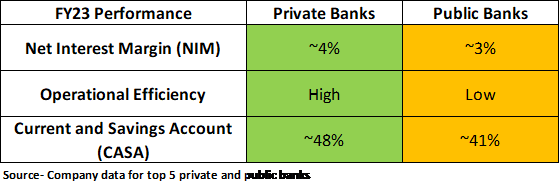
Conclusion
The data supports the preference for private banks over public banks in India. The consistent higher NIM figures of private banks indicate stronger profitability, while their competitive CASA ratios demonstrate their success in attracting low-cost deposits. Additionally, the better Cost to Income ratios of private banks reflect their operational efficiency and cost management practices. The table below summarizes our view of the Indian banking system, with a clear preference for private lenders.

Should you have any queries on the above information, please do not hesitate to reach out.
Have a great weekend ahead!
Regards,
Managing Director and Founder
Opportune Wealth Advisors Private Limited
Investment Adviser (SEBI – INA000005366)
Check our website: | www.opportunewealth.com | Disclosures
Dear Investors,
Hope you are well.
Where will the equity markets go — up or down?
Opportune Wealth gets this question asked a lot… We are not soothsayers to know exactly where the markets will go. In fact, even the best investors in the world — Howard Marks, Warren Buffett, and Charlie Munger, cannot tell you where the markets will be tomorrow or even a few months down the line. All they (and we) can say is with an educated guess, what are the reasons why the markets might move up or down…
Looking at the macroeconomic data, both for US and India. Opportune Wealth can say that Indian CPI and WPI inflation is coming down. This is a positive sign and may move the RBI to bring down interest rates. When interest rates come down, equity markets tend to move up. The reason for this is that money is always in search for the best yield or returns! And as the interest rates on fixed deposits slowly come down, people would want better returns on their money and wager this money on the equity markets — thereby moving markets up.
On the US side, however, the numbers appear quite grim. Macroeconomic numbers suggest that there are going to be further job losses. Inflation is at peak, so the monetary policy of the central bank (or the Fed) there may continue to raise interest rates.
What does this mean for the US economy? The US economy could move into stagflation, which means high inflation and very, very low growth. This is not good for equity markets and if Indian equity markets take cues from the US market and not the Indian market, India Indices could fall.
Also in this globalized world, looking from a fundamental perspective, some of India's key sectors like IT, Technology are closely linked to the US. Some of the other Indian sectors like chemicals, pharma also rely on the United States for demand. On the other hand, the domestic-led industries such as consumer, banking while they get revenues and customers from India, banking around the world is very closely linked and so far our Indian banking system has not failed us.
However, U.S. banking is appearing to move into a crisis and we really hope that this is the end of the crisis and things will continue to look good. We are betting on markets moving up based on India data and the worst being over for the US.
What are you betting on?
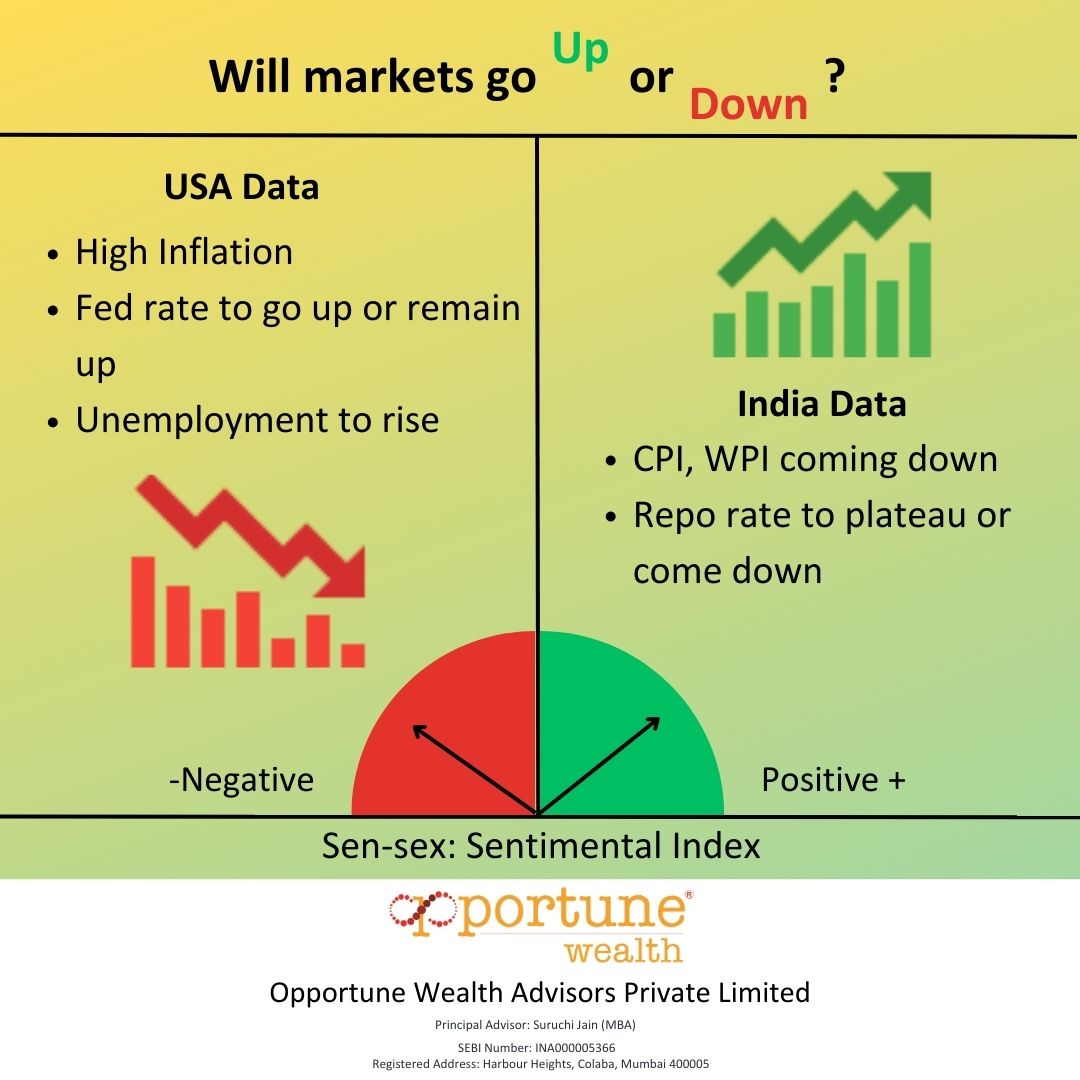
Warm Regards,
Managing Director and Founder
Opportune Wealth Advisors Private Limited
Investment Adviser (SEBI – INA000005366)
Check our website: | www.opportunewealth.com | Disclosures
Dear Investors,
Hope your week went well.
All Indian publicly listed companies recently released their full-year FY 2023 earnings. We watch these earnings very carefully. We have summarized the sectors that we watched and what were the key developments in each of these sectors. All of this is publicly available information, and rehashed to make sense for our readers.
1) IT Sector-
Information technology is an area of great development in the Internet age and the smartphone age. We believe it's an area for growth for many years to come, we are only seeing the tip of the iceberg.
As a growth investor, Opportune Wealth® has banked on the Technology sector for the last couple of years and bought shares of companies at very cheap valuations which are now trading 3x and 4x their original purchase price.
We, at Opportune Wealth® think smartphones will outlive the computer age. Tablets, mobile devices, connected TV are all areas of immense penetration. There are ways that companies are trying to monetize these areas. Electric vehicles (EV), and the automotive sector in general, is an area of investments that we try to avoid investing in directly due to its cyclical nature. Instead, we have taken a bet on the EV sector through IT Companies servicing the EV space on the software side. This has worked well for us thus far.
2) Pharma sector-
The other sector we have always liked is pharmaceuticals (pharma) and health care services. Pharma* is a long-term trend. Unfortunately, it only has a 5% weightage in the popular Indian Nifty 50 index. With passive investing making its way into every household and SIPs (systematic investment plans – mostly in monthly installments) increasing in that space, the Nifty 50 has become a force to reckon with.
Opportune Wealth’s pharma stocks have done well for us in the last couple of years. However, we are now underweight pharma in FY 2024, and believe it is a 10-year trend that will emerge again after a few years. COVID really helped increase the valuations of most of our pharma and healthcare stocks and we made good gains. In our view, now is the time to avoid the sector for some time, and we will re-enter when we find the right value in decent growth stocks.
3) Banking sector-
Banking is our favorite sector. We at Opportune Wealth® have been in the sector from the day we started investing our client money with our first stock being none other than – HDFC Bank. Currently, we do not have a holding in HDFC Bank. We have other banks in which we prefer to hold our client's money. We prefer large private sector banks for reasons of the quality of asset book, low operating costs, high fee income, and high yielding retail assets. All of these add to the profitability of the bank stocks that we hold.
4) Insurance sector-
We also like the insurance sector. Unfortunately, it has not reaped the benefits of all the changes that have come about. The reason is that the price at which a stock is bought in the portfolio determines how long it will take to reap benefits. Insurance has always been an expensive sector from stock price perspective. Opportune Wealth® clients have a very small allocation to the sector only from the perspective of it being a long-term trend, and we would like to participate in the sector. We think there are inherent moats from the floats that insurance brings to the companies. How well the insurance risk and float is managed within the insurance company, of course, ultimately determines which player will be the winner in the long run.
5) Non-Banking Finance-
Additionally, we prefer to also look at non-banking finance companies, which sometimes give the benefit of both being a bank as well as having more steam to grow faster.
6) Consumer companies-
Lastly, we like consumer companies, both in the fast-moving consumer goods, as well as white goods, or consumer durables. We prefer companies that have high growth and are available at cheap prices. We recently launched our portfolio on home improvement, which includes everything which goes from painting to repair work in the House products and services. Our portfolio has done quite well. It has gone through some cycles, and we believe it will continue to reap the benefits in the long run.
Picking up the ‘right company’ in the ‘right sector’, at the right price is the job of a portfolio manager, and understanding the market cycles and doing all of this at the right time is again art rather than science. We believe we have mastered the science and the art will get refined over time.
If you like what we have written please do reach out to us for a conversation about our services!
Thank you!
Regards,
Managing Director and Founder
Opportune Wealth Advisors Private Limited
Investment Adviser (SEBI – INA000005366)
Check our website: | www.opportunewealth.com | Disclosures
— Content Approval Taken from BSEAL Before Publishing on 25 May 2023 —
Copyright Opportune Wealth Advisors Private Limited (herein named “Opportune”). All Rights Reserved.
Opportune is registered with SEBI as an investment adviser (registration number INA000005366). Opportune has not been the subject of any disciplinary action by SEBI and has no associate or group company. The information and opinions given here may include Opportune’s confidential and proprietary information, are not warranted to be complete or accurate, should not be copied or distributed without Opportune’s prior written consent, and are not to be regarded as an offer to buy or sell any particular security. Please note that the information and opinions given here are not intended to constitute legal, tax or financial advice; so, before making any investment decision in any security, please consult your legal/tax/financial consultant and read the underlying documents, as applicable, including the risk factors involved in investing in the security. Opportune, its directors and employees shall not be responsible for any trading decisions, damages or other losses that may be incurred by anyone consequent to relying upon the information and opinions given here. Investments in securities are subject to market risks and there is no assurance or guarantee that the intended investment objectives will be achieved. Past performance may or may not be sustained in future and is no indication of future performance. The price/value/interest rates of securities and mutual fund schemes fluctuates, therefore, the value of investors' investments in stocks / mutual fund schemes and the income derived from them may go up or down. The terms and conditions on which Opportune offers advisory services to clients vary from client to client and are spelt out in the respective client agreement. Opportune and its clients, employees, Directors may have vested interest in the securities mentioned in this research document. Please use your best judgment on making decisions pertaining to your individual investments.
Dear Investors,
Hope you are well.
As Robert Kiyosaki, author of the famous book Rich Dad Poor Dad puts it: “Equity and debt markets are like yin and yang; they complement each other and create balance in the financial world.”
In recent times, with central banks around the world continuing to increase interest rates to curb inflation, the equity markets have been in a downward spiral. At times like this, it helps to have a certain portion of your savings (say 25-30%) in debt-related products and some of it (at most 5%) in gold. For the longer term, however, bulk of (about 65-70%) of total portfolio should be in equity-linked products. The reason for this is ample protection from 30-35% of your debt-gold holding, while 65-70% of your portfolio swings with the equity markets and gives you better returns in the next 5-10 years. Be mindful, that any money invested in equities should be invested (in good stocks, companies) and forgotten for a minimum of 5 years. In periods like this, when interest rates are high, equity underperforms while debt gives us a cushion of steady returns.
In a recent employee investor awareness seminar that we conducted for yet another multinational corporation, we described the basics of asset allocation and what they should aim for over a 40-60 year life span. The basic premise being that the average lifespan for most of us may range between 80-to-100 years!
Yes, that’s right a recent study from London Business School makes this point fairly clear – see the 2 minute
video here: https://youtu.be/6utvj_Awq3Q
What would you do differently today then, knowing that you would live till 100 years?
I would definitely spend more time (and money) on my health and overall well-being. Also, I would save and invest for the future.
Sharing a simple chart (below) that we used to explain the future of investments. If you were 40 years old and felt like you had missed the bus on investing early, starting now with just INR 10 Lakhs if you grew your investments with an average of 12% post-tax returns over the next 60 years, you would have INR 89 Crores at the end of your life!
If you grow, INR 10 Lakhs at 10% post-tax returns you will have INR 30 Crores at the end of 60 years. At 8% post-tax returns, you will have INR 10 Crores. At 5% post-tax returns, you will have approximately INR 2 Crores.
See how varied the outcomes are, based on your investment returns?
All you need is a little planning and time as your best friend.
Hope you found this insightful. Feel free to reach out to us at Opportune Wealth® for more on investments.
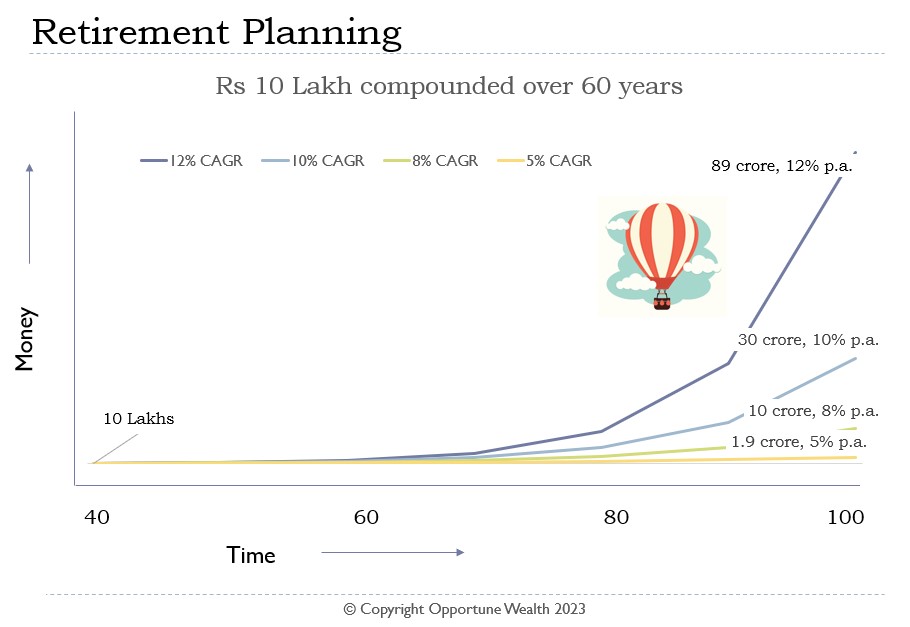
Have a nice weekend ahead!
Warm Regards,
Managing Director and Founder
Opportune Wealth Advisors Private Limited
Investment Adviser (SEBI – INA000005366)
Check our website: | www.opportunewealth.com | Disclosures
Dear Investors,
Hope you and your family are well.
As the financial year comes to a close, have you done your tax-saving investments?
If you are looking to make investments for tax savings, do reach out to us for our list of recommended Mutual funds.
Each mutual fund has been carefully selected basis the Opportune Wealth Mutual Fund Research Methodology:
We look for four factors:
Ø Minimum track record of 7-10 years
Ø Risk-Adjusted Alpha over benchmark
Ø Quality Portfolio Holdings
Ø Experience with a sound investment style
My team would be happy to assist you in buying the Direct Plans or Distribution plans for the Mutual Fund Scheme of your choice. All investments bought through us will reflect in your Quarterly Opportune Wealth Statements and be regularly monitored, and tracked closely for performance.
We are happy to discuss this further over an individual phone call, on what is most suitable for your needs.

Have a nice weekend ahead!
Warm Regards,
Managing Director and Founder
Opportune Wealth Advisors Private Limited
Investment Adviser (SEBI – INA000005366)
Check our website: | www.opportunewealth.com | Disclosures
Dear Investors,
Hope you are well.
It has been nearly a month since we moved to our new office, and we wanted to give you a quick update on what is happening.
We inaugurated our Nariman Point Mumbai office on 20th January 2023 – attached are a few photos. We had many clients and well-wishers attend the opening ceremony, and it was a real pleasure to see the support.

The new team has settled into the office and we had a good quarter-end in December 2022. The special scheme we ran for referrals in October to December 2022 – will be receiving a book signed by famous investor – Mr. Ramesh Damani, Chairman of Avenue Supermarts and Member of Bombay Stock Exchange. Attached are photos of him signing the book.
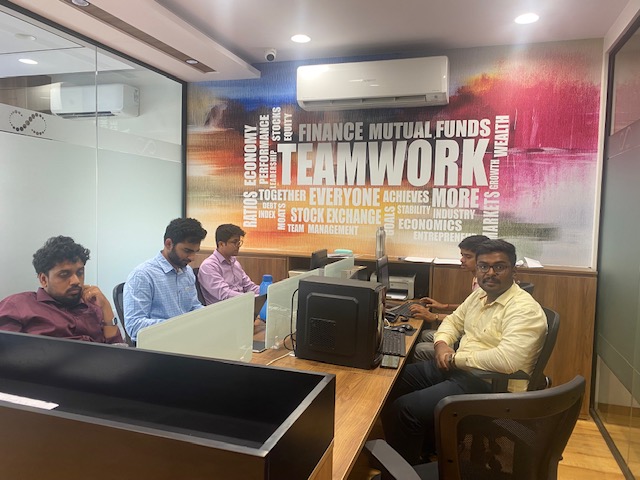
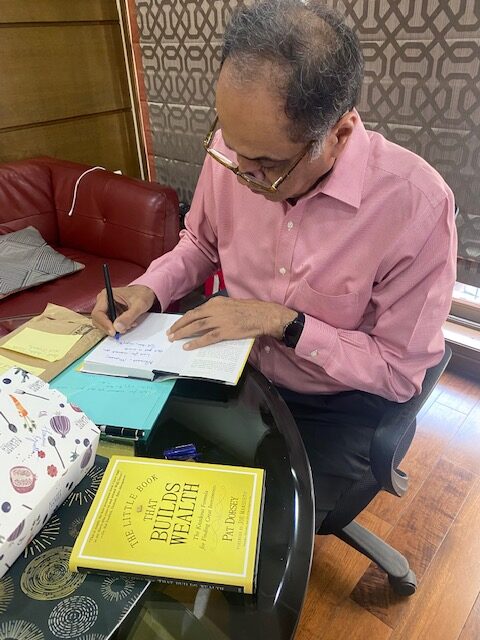
Mr. Ramesh Damani visited our office for lunch this week, along with our Director and Chairman Mr. Ajaya Jain. Both of them spoke to the team and gave their nuggets of wisdom for having a career in stock investing. They also shared their vision for Opportune Wealth for the coming 10-20 years, and encouraged us to make the brand name a force to reckon with. Photos from the visit are below.
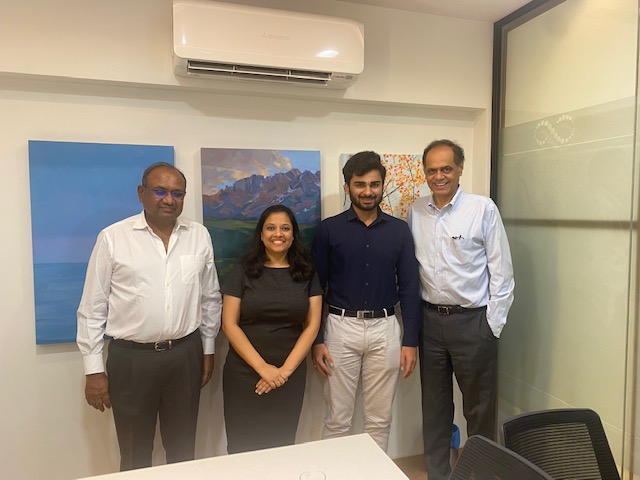
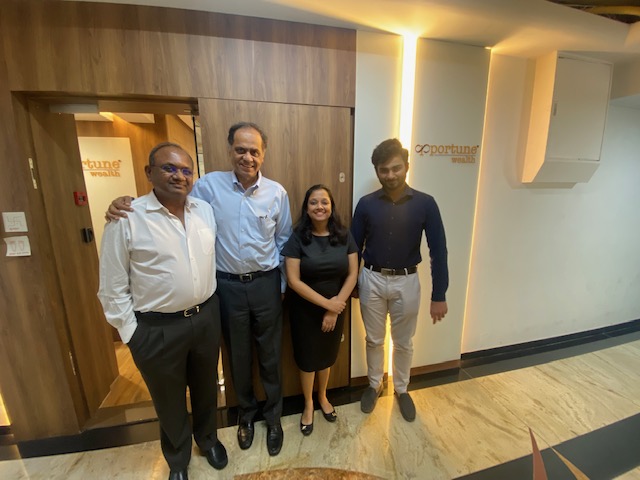
Belated wishes from the Opportune Wealth team for Valentine's Day! We believe every woman should work towards her financial independence, and here is a great way for spouses to support the journey. As a special offer, we are accepting INR 10 Lakhs for the month of February 2023 if you open an account in your spouse, sister or daughter's name. Gift your loved one financial freedom in the future.. open an Opportune Wealth equity advisory account for them today!

Lastly, we held a webinar earlier today on Motilal Oswal Web Portal and Mobile App. Please see the youtube link to the webinar-
Youtube Link-
https://youtu.be/rFzqaAUfcrQ
As always, feel free to reach out to me or my team over email or Whatsapp..
Have a great weekend ahead!
Regards,
Managing Director and Founder
Opportune Wealth Advisors Private Limited
Investment Adviser (SEBI – INA000005366)
Check our website: | www.opportunewealth.com | Disclosures
Dear Investors,
I Hope 2023 has started off well for you…
I am writing to share some insights from the quarter gone by. Looking at the returns of the indices, one can tell that certain sectors were in favour (Banking, Financial Services) and others out of favour (IT, Pharma). Furthermore, even though indices were up by a lot in April 2022, one can see a major correction in December 2022.
Volatility is the nature of equity investing. Markets, indices, and portfolios go through ups and downs in the short term; more akin to a random walk pattern with little logic. However, if analyzed and invested well – equities as an asset class have the ability to outperform debt and fixed-income products like Fixed deposits or corporate bonds. The two factors required for long- term wealth in equities are patience and skill. With investment advisors like us and their skills on your side, you can hope to generate Return and Growth of your portfolios as well.
As we have been speaking to many clients on personal finance topics lately, we have come to realize certain behavioral biases that exist in all of us. Firstly, we as investors have the need for instant gratification. The human brain likes predictability in the form of regular cash flows. As a result, fixed deposits – that pay out interest to our bank account – are popular instruments of investment. As per RBI data, about 52% of financial assets continue to be held in fixed deposits as of March 2022. In fact, this has increased from 46% in March 2012.
Secondly, although it is common knowledge that interest from fixed deposits attracts taxes, our mind mostly looks at pre-tax profits and gains. At Opportune Wealth too, we have decided to take advantage of the low taxation of 10% for long-term capital gains (and 15% for short-term capital gains on equity), to optimize pre-tax gains across portfolios. This may result in a slightly higher number of trades, but it is in order to capture higher absolute gains versus minimizing trades, and taxation on a portfolio. It may be worth noting that you have the flexibility to decide when to sell equities and incur tax only on realized gains, unlike interest from FD which is taxable once received.
Thirdly, the nature of each financial instrument is different, and therefore each of them finds a spot in our portfolio. Fixed assets have regular coupon payments while keeping the principal intact. Gold has the ability to beat a recession, but performs once in 6-7 years. Equities have the ability to beat inflation in the long term and a tendency to make losses in the short term, thereby the most volatile of the three. It is no wonder then that only 4.5% of Indians invest in equity, and 10% in mutual funds
It is always hard to buck a trend early, and there will always be naysayers. It is up to you then to believe in the power of compounding – the eighth wonder of the world as per Albert Einstein.
One has to realize, the real risk is not volatility, the real risk is not beating inflation. Don’t give up at the bottom! (As our image shows).
We hope you continue to keep us as a trusted partner in your asset management growth, knowing fully well that we have your best interest at heart.
We hope you found this helpful. Happy investing with a long view!!

I hope you found this note useful. Please do share your thoughts and feedback with us, if any.
Have a great weekend ahead!
Regards,
Managing Director and Founder
Opportune Wealth Advisors Private Limited
Investment Adviser (SEBI – INA000005366)
Check our website: | www.opportunewealth.com | Disclosures
Dear Investors,
Hope your week went well.
As we head into the last month of the calendar year, I am happy to share some colour on a few changes we have made in our overall investment framework to make it more robust and dynamic.
As an over-arching framework, we continue to follow our four-pronged approach:
Our current Research Methodology remains unchanged:
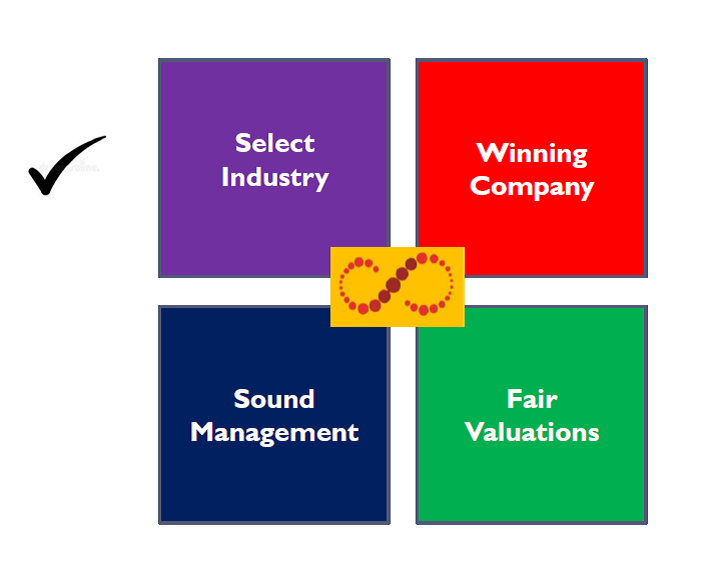
Step 1: We start with selecting the industry we want to allocate money to. We have few preferred industries (as mentioned in our September 2022 Newsletter). We may go over-weight or under-weight one sector based on the overall macro-environment.We are watchful, however, of how far away from benchmark we are.We may also merge our theme-based portfolios to just one investment scheme for now.In order to add stocks across to our main portfolio. You may see some additional small-caps in your portfolio in the coming months if the stock price comes within our BUY range.
Step 2: Then we look at the universe of companies which meet both our qualitative filters in terms of business moats,as well as our market liquidity filters. Our market liquidity filters are most relevant for the small-cap companies in our portfolio. We try to limit exposure to mid-cap and small cap to the extent possible, to reduce portfolio volatility.However, we presently have not kept any maximum or minimum range for our multi-cap portfolio.
Step 3: We analyse management’s execution capabilities, track record, dividend policy and various other qualitative aspects. Lastly, we come to valuations. This is where we are making some changes, to make it more refined and robust.
Step 4: Earlier, if a company met our qualitative checks and ‘At least double in five-year period’ criteria in terms of valuations, we would buy the stock. Unless there was a significant change in our investment thesis, we would continue holding it for a period of 3-5 years. At the end of this period, and after significant upswing, we would completely exit our position in the company at one go. In the interim period, if we found any major issues with management decisions, industry dynamics.
Going forward, however, we are keeping some valuation triggers for partial exits in each stock in order to capture ALPHA generated in a portfolio. This decision-making trigger is based on the return projections of each company for the next 2-3 years. These valuations will be revised every quarter on an ongoing basis.
What these changes mean for all our investors?
This shift means that we are moving away from model portfolio approach where we invest in the same set of stocks and with roughly the same allocation for all clients.We are now moving to a valuation focussed portfolio. This would mean that our client portfolios will be different if they are coming in at different points of time. Someone joining us
in December 2023 will have a portfolio based on which stocks are offering the best returns to us at that time. It may not be necessarily the same as that of existing clients.
This will also mean that we will move in and out of stocks a bit more than earlier. Please don’t be perturbed by this move.
Why we have made the change?
In a constantly evolving market, we believe in improving our research and investment process constantly. The valuation-based entry/ exit approach with partial increase/ reduction in holding, should add further alpha over time.
I hope you found this note useful. Please do share your thoughts and feedback with us, if any.
Have a great weekend ahead!
Regards,
Managing Director and Founder
Opportune Wealth Advisors Private Limited
Investment Adviser (SEBI – INA000005366)
Check our website: | www.opportunewealth.com | Disclosures
Dear Investors,
Last weekend, I was at a conference in Bangalore organized by Iron Lady, a leadership training company focused only on working women. Their aim is to have a million women in top corporate jobs, as entrepreneurs and business owners. They provide ongoing training, mentoring and support to ambitious women facing genuine obstacles on the way up.
As part of the conference, each entrepreneur was to market themselves through their outfit. Here’s what I came up with — photo attached. A salwar kameez, completely covered in Indian notes (play money of course ;)). I got much attention and was called on stage to speak about my company, Opportune Wealth Advisors Private Limited.
Opportune Wealth had also sponsored the event with the intent to help women gain more control of their financial decisions through our investment advisory services.
Most Indian women, continue to rely on their spouses, parents to make financial decisions despite being a financially independent earning member of the family. This is the unfortunate truth of many households. We hope to play our part in assisting women make their own decisions, and also be more financially aware in case they have a need in the future.
One such story where we have had a positive impact was covered in the recent Chicago Booth MBA magazine. Do read the article here and share your comments with me. (I’m in the green T-shirt with spectacles, standing in the front row for the image in the article).
Chicago Booth Magazine Article Link— https://www.chicagobooth.edu/magazine/family-of-alumni
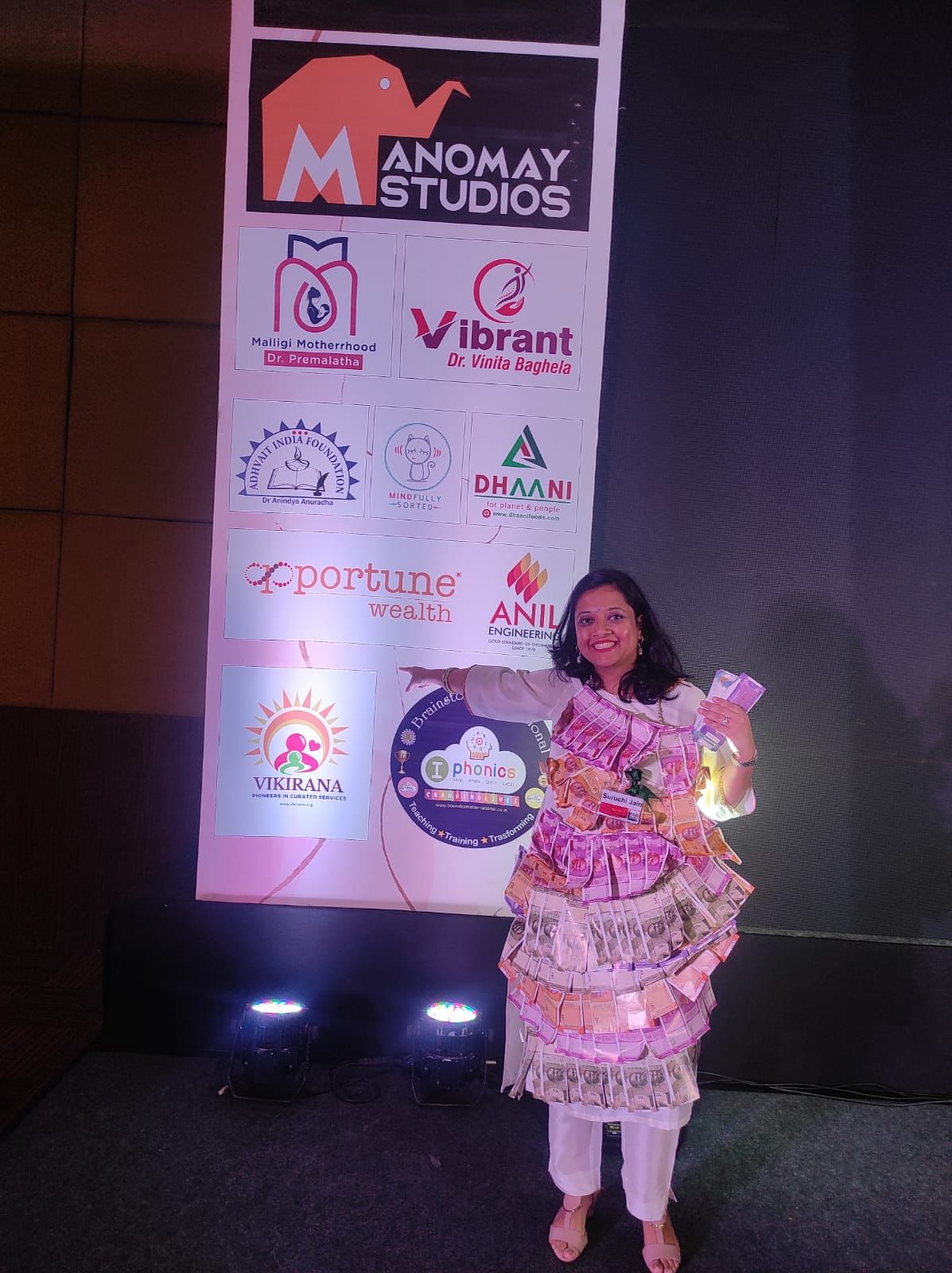
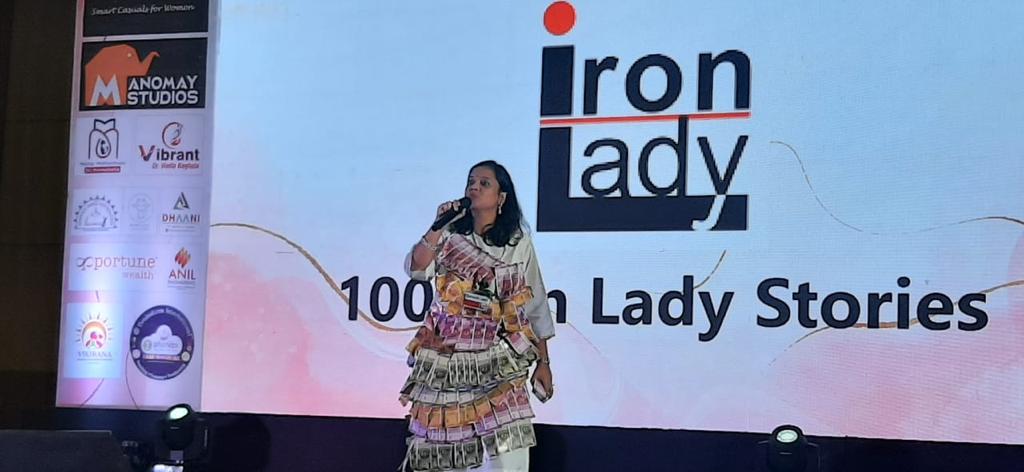
Suruchi Jain (Principal Advisor)
Managing Director and Founder
Opportune Wealth Advisors Private Limited
Investment Adviser (SEBI – INA000005366)
Check our website: | www.opportunewealth.com | Disclosures
Dear Investors,
Hope your week went well.
I wish to touch upon a personal finance topic that sometimes gets overlooked by us – Retirement Planning.
Most people don’t end up saving up for their retirement. They focus on settling their children’s life. While there is nothing wrong with that, the longevity of the human cycle is increasing due to advancements in healthcare and medicine, and increasing the standard of living, one needs to focus on their retirement needs. We at Opportune Wealth, see retirement as a major focus for several of our clients.
With new products entering the market in the retirement space every year, the general awareness about planning for retirement has definitely gone up particularly post-pandemic.
However, we do see a lack of pension-planning products for private-sector employees. It is one thing to have enough and another to not have enough at a point in time.
If you are looking out for your retirement planning, please reach out to us and we can help to reach your retirement goals.
Have a nice weekend ahead.

Regards
Suruchi Jain
Managing Director and Founder
Opportune Wealth Advisors Private Limited
Investment Adviser (SEBI – INA000005366)
Check our website: | www.opportunewealth.com | Disclosures
Dear Investors,
Hope you are enjoying the festive season with your loved ones.
As another quarter draws to a close, we would like to share our investment strategy and outlook.
Although the geopolitical / global scenario does not look ideal, we believe India is uniquely placed for a multi-decade growth story. India’s per capita incomes are rising, its balance of payments is in check and the central bank is making the right moves in an inflationary environment. While stock-returns in the short run will move with global markets, long term we believe India will outperform.
Coming to our immediate discussion on your portfolio, we have 2-3 underperforming stocks that have been with us for over one year. We believe in giving a stock ample time to perform, and track fundamentals more closely than stock prices. This is because we are looking to build wealth for our clients through sound investment decisions, instead of trading in and out of stocks. (Always remember, while we are no tax experts – you only pay taxes when you sell a stock or get a dividend — however, tax liability is near zero if you just hold on to the stock.)
Banking, financial services are our favourite industries to allocate money to when the interest rate cycle peaks. While some more tightening may be near the horizon, the markets are reacting quite differently this time compared to historic trends. Our hope is that historic trends will play out in a few months, and we wish to be ahead of the curve in allocating to the sectors we feel will move ahead of the benchmark indices (Sensex, Nifty 50). As the interest rate cycle peaks, we may move to our strategy of taking a high allocation to financial services stocks. It should perform well in the coming cycle, in our opinion.
In recent months, as you would notice Sensex and Nifty 50 have continued to move up despite interest rates going up. This is due to continued domestic investments through SIP inflows into equity mutual funds. As you know most mutual funds mirror the indices, as a
result there has been relentless buying in the benchmark holdings and these companies have performed well from a stock-price perspective. Passive investing through Exchange-traded funds (ETFs) is also coming hugely into fashion in India of late. This has further boosted benchmark stocks. As all fundamental stock-pickers hope, we too hope that in the long run stock prices will reflect superior fundamentals of good companies and not just the temporarily popular ones.
“You win some, you lose some.”
In every investor’s journey, there will be some decisions that work out extremely well and few that don’t. In our journey as well, the timely exit/trimming down of exposure in banks and a few other stocks early last year worked well for us. Similarly, doubling down on two midcap tech companies over the last couple years in slightly high-risk portfolios, also generated significant alpha for our clients. On the other side, we currently have two stocks which have significantly underperformed in the last one year. We believe it is an ideal time for us to cut the weeds from the portfolio.
Our returns remain healthy for portfolios beyond 2 years. Average returns are 18% for our oldest client (time period March 2017 to March 2022) versus 14% for Nifty50 and 13% for BSE500 index.
We remain confident that we will be able to replicate this performance despite the underperformers that have kept us behind in the last 3 months. Be rest assured that things will look better if you stick around for 3-5 years as an Opportune Wealth® client. Having said this, we have never lost money for a single client – even if they were with us for under 2 years. Each and every client has paid fees from profits and still taken some bounty home.
Regards,
Managing Director and Founder
Opportune Wealth Advisors Private Limited
Investment Adviser (SEBI – INA000005366)
Check our website: | www.opportunewealth.com | Disclosures
Dear Investors,
I hope you had a great week!
As a part of our Mutual fund Research, we are pleased to share our MF Research Methodology with you. At the core of our fund scheme selection process are four factors:
1. Minimum track record of 7-10 years of the mutual fund
2. Consistently superior Risk-Adjusted Performance
3. Quality Portfolio Holdings to deliver good returns going forward
4. Sound investment style of the fund manager — while meeting fund objectives
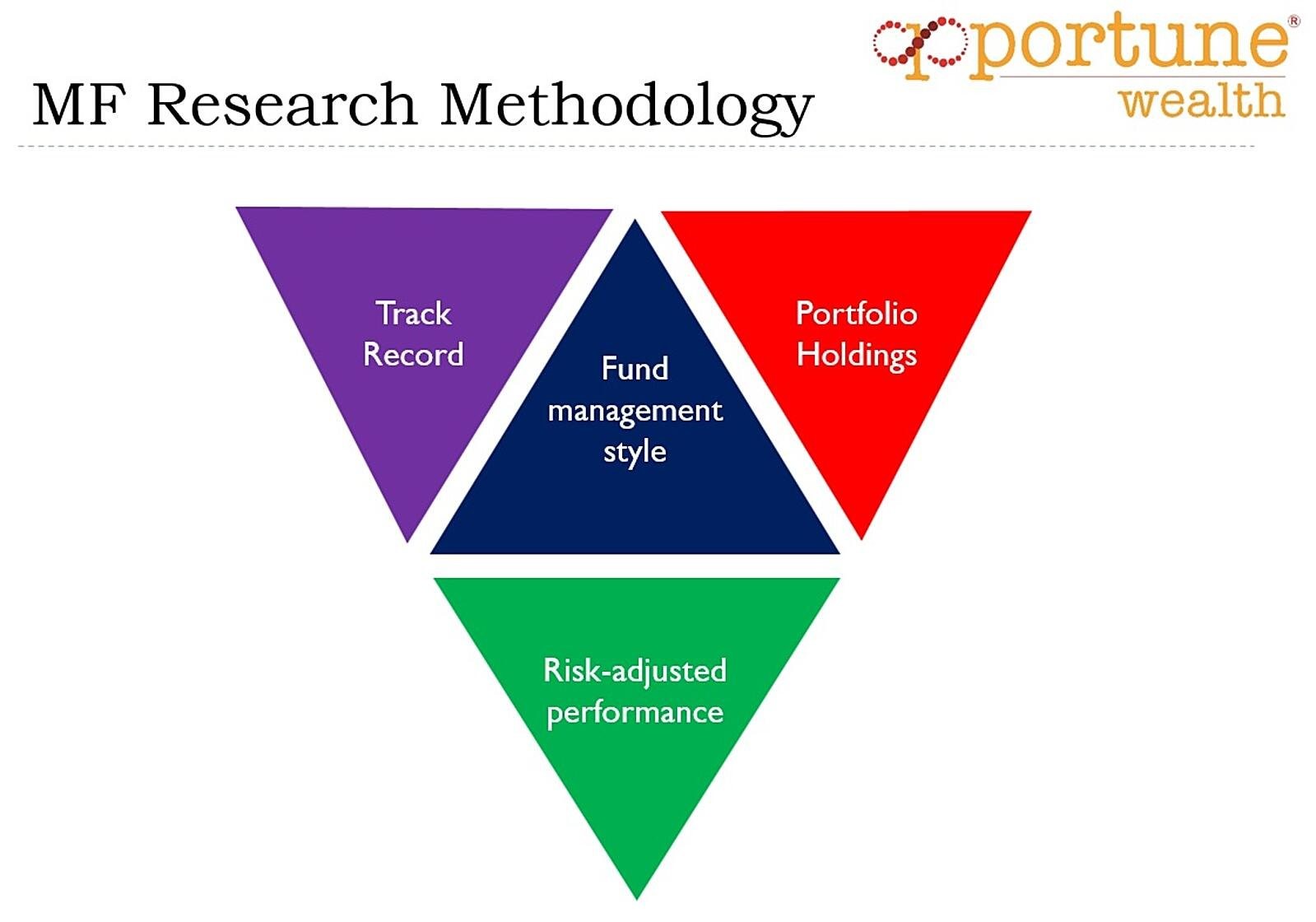
Based on these factors, we have chosen the two best schemes per category, that is — Equity – Large cap, Equity – Multicap, Debt – Short term, etc. Feel free to reach out to us should you wish to look at our most recent list of Recommended Mutual Fund Schemes, updated as of August 2022.
For more details, on the recommended schemes, please write to us and we will set up a time to discuss our list with you.
We are happy to assist you in buying the Mutual Fund of your choice. All investments bought through us, will reflect in your Quarterly Opportune Wealth Statements to be monitored and tracked closely for performance.
We look forward to hearing back from you on your mutual fund investments. We have also received very good responses for our MF portfolio reviews over the last month. Happy to discuss more about this service as well.
Regards,
Suruchi Jain
Managing Director and Founder
Opportune Wealth Advisors Private Limited
Investment Adviser (SEBI – INA000005366)
Check our website: | www.opportunewealth.com | Disclosures
Dear Investors,
Hope you and your family are well.
As financial advisors, our mission is to help grow your wealth through equity investments, and also manage other aspects of your financial wellbeing. Sharing our service menu below for the additional services we offer at Opportune Wealth. Happy to discuss this in more detail over a call. Our most popular service these days is a Mutual Fund Portfolio Review.
Feel free to reach out on clientrelations@opportunewealth.com for setting up a meeting to review your existing investments.
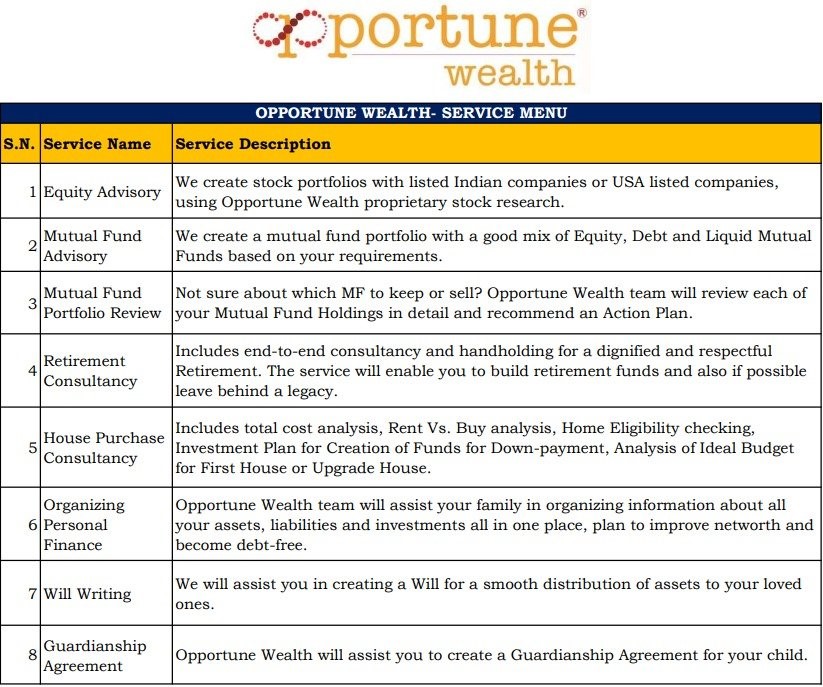
Hope you continue to take small steps towards your financial freedom.. Here’s wishing you a Happy Independence day weekend !!

Regards,Suruchi Jain
Managing Director and Founder
Opportune Wealth Advisors Private Limited
Investment Adviser (SEBI – INA000005366)
Check our website: | www.opportunewealth.com | Disclosures
Dear Investors,
Hope you are well.
Howard Marks once said in his memo, “Gold is a lot like religion; either you believe in it or you don’t.” Gold has a deep-rooted connect with Indians and there is a lot of emotional value attached to it. No wonder why Indian households have accumulated over 25,000 tonnes of the yellow metal!
In our opinion, we see gold as a hedge against high inflation and severe global uncertainty. However, as a long-term investment asset, especially from a capital appreciation perspective, we do not recommend it.
For over 3000 years, gold has stood the test of time. There are certain qualities which makes gold valuable. It has been a reliable store of value, especially in challenging and uncertain times. It is highly liquid, scarce, provides a hedge against inflation and is accepted worldwide since the start.
When a black swan event happens like covid-19 for example, it leads us to question the predictability and understanding of the financial world. This uncertainty shifts our attention to instruments that can provide you comfort and safety. Gold fits this bill perfectly. For centuries, it has been a dependable asset. Even governments across the world hold gold as a reserve for issuing currencies. One added benefit that Indians have when it comes to gold, is that because it is dollar denominated, we get the benefit of rupee depreciation of 2-3% every year on average.
On the other side, gold in itself has very low usage. There are no cashflows. Thus, there is no clear way to know what is the intrinsic value of gold. Come to think of it, gold prices can be deceiving as there is no financial value other than what people give it. There are a lot of factors at play, inflation impact, interest rate cycle and dollar movement that affect gold price but inherently there are no other fundamental factors basis which one can work out the value of gold.
Putting it all together, what we end with are short term price rallies caused by the behaviour of people in times of economic despair and it usually rallies once in 5-7 years.
We do not recommend holding more than 5% of your portfolio in gold. It remains an ideal hedge against black swan events like the global financial crisis of 2008, covid-19 outbreak, etc.
Hope you found it useful. You can also subscribe to our newsletters by filling out the below google form;
https://forms.gle/GttTPzfPJYkSYPQu9
Have a great weekend ahead!
Warm Regards,
Suruchi Jain
Managing Director and Founder
Opportune Wealth Advisors Private Limited
Investment Adviser (SEBI – INA000005366)
Check our website: | www.opportunewealth.com | Disclosures
Dear Investors,
Opportune Wealth® turns six!!
Opportune Wealth ® turned six on 3 May 2022… I can proudly say the last six years have given me some of the best moments of my life. We have seen our clients achieve their financial goals, helped clients jolted by the loss of a loved one to achieve financial stability, or even help a client pay off all their loans and become debt-free. The journey so far has been fulfilling, to say the least, and I can’t wait for what lies ahead…
Having been in several virtual meetings this past year, I am positive that helping people with money matters is my calling… I find much internal peace and happiness in helping change people’s lives with good financial decisions. It goes much beyond just being a good stock picker (which of course is a given). I find that I have found my purpose in life. Not only do I enjoy researching companies, but also discussing and helping my clients see my point-of-view.
In the words of my mentor, and famous investor — Mr. Ramesh Damani – “ I have no doubt that Suruchi will treat your money as she would treat her own children’s money.. as she realizes it is a sacred obligation she takes on.”
Listen to what he had to say at our sixth-anniversary celebration —- (click the link here):https://youtu.be/d0Ot8apYVbU
We are committed to being in the business of investments for the long term… and follow in the footsteps of Charlie Munger and Warren Buffet. In order to signal to the market about our commitment, we have registered our brand name – Opportune Wealth ® and Opportune ® with the authorized entity for trademarks in India, the Office of the Controller General of Patents, Designs and Trademarks.
While traditional forms of investing are being continually challenged by artificial intelligence, I am positive that Opportune ® will find a way to remain market-relevant and always keep client needs ahead of our personal gain. Despite an ever-evolving environment, the Opportune ® Team has ensured client retention is 100%. We have grown our assets under management significantly over the past two years, and this has been possible with the support from existing clients as well as our marketing efforts.
As a parting thought, we have taken up some community, CSR activities. Opportune Wealth® provides health insurance cover to security guards in my residential complex as several are not covered by the Prime Minister’s Ayushman Bharat scheme. Most recently, we contributed towards the cancer treatment for one such security guard’s father. We also made a small contribution to the Datri foundation for preserving the art heritage of India.
As we look to add good long-term returns to client portfolios, we also look to add value to our client’s lives, and to the community beyond…We hope to stay the course for many years to come. We wish for you to stay by our side on this journey together.
Warm Regards,
Suruchi Jain
Managing Director and Founder
Opportune Wealth Advisors Private Limited
Investment Adviser (SEBI – INA000005366)
Check our website: | www.opportunewealth.com | Disclosures

Opportune Wealth: Falling Stock Prices vs. Best-in-the-Decade Growth (May 2022 Newsletter)
Dear Investor,
Hope you doing well
We are in a market correction led by interest rate increases in India and around the world, as central banks try to curb inflation.
Those who have invested in recent months will have to wait out this correction and look at the long term benefits of investing in equities. As Warren Buffet says, “A market downturn is an opportunity to increase your ownership of great companies with great management at good prices.”
We are convinced that this macroeconomic scenario is temporary. After six to twelve months, you will look back upon this period as a great buying opportunity.
We are optimistic about the future, and recommend that you continue investing by the bucket loads with a 5-10 year horizon. Yes, the mental model and fear in our minds prevents us from taking a position of a BUYER when everyone around you is saying SELL. However, lower entry prices for many investors have made them a fortune during Covid in these very same equity markets. With Covid behind us, I think we are in a good place to see strong company earnings – as has been the case already when we look at year-end corporate earnings numbers.
When the IT industry is going through the most positive changes, why would one worry about slipping stock prices? Would you not want to witness the decade long growth story ahead of us? I’m just using IT sector as an example, however, the growth is in many more sectors of the Indian economy as well.
In the Infosys March 2022 quarter ending earnings conference call, Infosys management said, “We have had an exceptional year with an annual growth of 19.7% in constant currency terms, which is the fastest growth we have seen in 11 years.”
If the leader of the IT industry is saying that they are witnessing strongest growth in a decade…Isn’t it surprising that the Nifty IT index has fallen more than BSE Sensex and Nifty 50 in recent times. See chart below.

One could attribute higher multiples to this drastic fall, however, what I really want to point out – is that share prices are often at odds with reality of company performance or even future prospects.
One should evaluate what future potential does a stock hold before buying into it, and that matters the most. In case you would like to learn more about how we analyse stocks, and research them – I’m happy to get on a one-on-one call with you.
Regards,
Suruchi
Opportune Wealth: Does NOT Recommend Delhivery IPO at these valuations, Wait for Lower Price at Listing
Dear Investors,
Hope all is well.
Markets are at really good levels to invest additional money, if you have any spare funds. In this environment, it is a good idea to add proven stocks to your portfolio, versus look for an IPO subscription – however tempting it may sound.
We wanted to capture the essence of our Delhivery IPO Note here. For more information feel free to read the note attached.
Industry:
Logistics is a large addressable opportunity growing annually at 9%, and expected to grow to US$365 billion by Fiscal 2026.
Online purchases just about beginning for larger items, we feel that we have just scraped the surface of the overall potential for online deliveries in India.
Delhivery has developed a SaaS product which it hopes to sell to peers to manage their logistics better. It is going much beyond being a service to a product for all logistics companies which could have even more significant business potential over time.
Valuations:
Although the company is still in growth phase, and having losses presently. We believe there is huge opportunity for the business. The business model, unlike a Zomato, is well proven with several profitable peers listed on the bourses – Bluedart, VRL Logistics, Gati, TCI Express, to name a few.
Looking at the valuations, however, we are not keen to take a position in Delhivery at this point. We would recommend that investors make the best use of the current market correction and wait for the stock to list at a lower valuation before buying into the story.
A quick look at the comparables gives us the clear indication that the IPO is too pricy, and can be avoided in subscription stage.
This is our evaluation of the IPO. Feel free to take an independent decision on whether you would like to invest. Happy to speak further as you would like.
Opportune Wealth: Only short term profits possible from LIC IPO
Dear Investors,
Hope your week has gone well.
We wanted to share our perspective on the latest IPO of LIC. Provided below is a summary of our view. For a more detailed overview please check the document attached.
From a fundamental perspective, we are not recommending the LIC IPO. However, there may be a potential of listing gains if the market looks at the valuation of LIC from an Embedded Value (EV) Multiple perspective.
Higher Price band of the LIC IPO values it at 1.1 times EV whereas other private players are valued at 2-3 times in the listed space. This could be the only reason it will give a gain on listing.
From a fundamental analysis perspective — we are not happy to hold this company in our portfolio for the long term as its market share is declining and profitability is not at par with private players despite being in a growing market segment.
Overall we are very positive about the insurance industry and we already have one of the private insurers in our portfolio. We are happy to continue holding this company in our portfolio and we hope the LIC IPO will further boost the value of our holding company.
To read further, please see the document attached. I look forward to hearing from you on your views on the same.
Dear Investors,
Hope you are well, and adjusting back to normal outdoor life gradually.
As financial year 2022 has come to an end, I want to take this opportunity to highlight certain aspects of Opportune Wealth TM portfolio which you may find helpful in understanding our investment approach.
Our vision of the companies/ industries we invest in is 5-10 years out. We have a thesis /idea about the future of these sectors which will play out in a certain way, and in our mind, the stocks in our portfolio will be the winners in the sectors we have chosen.
However, in times when there are macro uncertainties, market sentiments change and become negative. So do short term returns!
In the last 3 months, several of the stocks in our portfolio have corrected sharply. Thankfully this has no bearing on their business fundamentals.
For example — Even a company like Bajaj Finance, one of the biggest wealth compounders over the past two decades, has had weekly corrections of over 30% many times in that time!
If an investor gets scared away due to volatile nature of stocks, and sells the shares of a long-term compounding company due to short-term correction… then he/she has lost the opportunity to make large gains over time.
The stories we hear of people becoming wealthy from stock-investing is RARELY due to trading.
Investors like Rakesh Jhunjhunwala held on to Titan company stocks for decades, this long-term tenure is what helped him gain massively from the value created by the company and this value eventually reflected in the stock price.
At OpportuneTM we are here to create a portfolio of companies for our investors, which far outperform the benchmark indices. Each of our stock-picks continue to remain fundamentally sound.
Therefore, we urge our investors to consider times of correction as a unique opportunity presented to add funds to the corrected stocks.
We continue to remain positive on the long term fundamentals of all our portfolio stocks. The management quality and execution remain top-notch and with the recent price correction, we feel it’s a great price to add to our existing position.
As always, please feel free to reach out with comments, suggestions. If you would like to know more about our investment offerings, please don’t hesitate to set up a time with us over a Zoom call.
Dear Investors,
Hope you and your family are well.
As we mentioned in our previous newsletters, equity markets across the world have been correcting. Amid all the noise and turbulence in the market, we continue to deploy spare capital in a phased manner. In this newsletter, I want to discuss how we at Opportune Wealth are navigating through this volatility.
There are essentially two factors which drive stock prices up or down- Sentiments and Earnings.
Sentiments are short term in nature. Market sentiments keep fluctuating and this is what causes sharp up moves or drawdowns in the short run. The current situation seems a classic example of this; rising oil prices, escalating tensions between Russia and Ukraine, increasing inflation, interest rate hikes by the US Fed are all factors weighing less on the earnings but more on the sentiments; leading to short term price corrections.
Eventually all short term factors fade away and stock prices catch up with the earnings in the long run. When you look at the chart for something that’s gone up multi-fold over 10-15 years, think about all the times a holder would have to convince himself not to SELL!

Sector Positioning for the future :
While not every stock will turn out to be a multi-bagger… being invested in the right sectors does increase the probability of success.
We continue to be invested in structural growth stories in the Indian market for the coming decade. These form the core of Opportune Wealth portfolio.

Sentiments and Earnings Equation- Current Situation:
The business performance of most of our portfolio companies continues to be strong in the recent quarters. However, individual stock prices are a part of the overall market. As market sentiments have changed with inflation fears and a lot of other macro factors, stock prices have corrected. As prices eventually catch up with business performance and over long-term, we should see good gains. This is the risk that comes with equities; returns tend to be lumpy in nature.
Addressing the elephant in the room
With a war like situation emerging in Europe with Russia invading Ukraine, it is important to analyse rather than panic. There have been several past instances of where we have seen global unrest over war like situations or terrorist activities. Here’s a look at how markets panned out in some of these events. While there has been correction post event, in most cases the recovery in the market has been swift.

I like to think of these falls as an opportunity to invest rather than to panic and sell. Bad events occur, but just as life, business goes on. At any point in time, there will always be plenty of factors to worry about – covid was a prime example of that. When it comes to investing, zooming out and take a broader picture on earnings and growth opportunity makes all the difference. Opportune Wealth Advisors is here to help you see that picture together.
We have our eyes on the ball and are watching these macro-headwinds and all portfolio stocks carefully. Our aim is to get market -beating returns in the long-run vs. in the short time period. If you haven’t yet scheduled a call with us, please reply to this email to set up the same.
Please feel free to reach out to me and Opportune team should you need anything. Happy Investing!
Dear Investors,
Greetings for the new year….hope you and your family are safe and well!.
Today I wanted to share my thoughts on the pharmaceuticals and medical space. An industry we have been investing in for our clients since 2019 — Much before the pandemic hit and the cycle towards higher multiples started for the industry.
Our thesis here is quite simple, although a bit contrarian to usual pharma investments. Having covered specialty pharma manufacturers as an analyst at Morningstar, I already knew that at Opportune Wealth, looking at branded players or generic manufacturers will not give us the alpha in our Opportune portfolio. Pharma companies in India alone offer 60,000 generic brands across 60 therapeutic categories! How does one know which company will come with a formula for the next blockbuster drug? Most pharma research analysts try to decode this problem… which I feel is hard.
Instead of trying to find one drug or one company which will be popular, my approach was to take a broader look at the medical space. This includes not just medicines, but diagnostics, medical equipment, and drug discovery too. The idea was that you want to catch a trend in the industry, which we believe is a stronger guide to future growth and returns than picking individual winners alone. Our segment selections within the pharma sector are below:
1) Diagnostics space as lab providers —
My theory here is that medical testing is becoming an important aspect, even before covid when we first bought a company in this space. There is increased awareness of hereditary disease, the need for medical diagnosis and propensity to spend on a cure — as more Indians are educated, and are earning more. Not only are the number of clients increasing but also the fee per test is increasing gradually for the industry as a whole.
You may ask why a certain company vs another, well therein lies a judgment call on management/valuations. Both of which is art rather than a science.
2) Drug discovery —
Much before Covid hit, we had a contract service provider to medical companies. The company helps provide scientists on the bench to help with the drug discovery process. Much like an IT outsourcing service, this company has been able to get 8 of the world’s top 10 Pharma and Biotech companies as its clients. Not only have they been able to outsource such a critical element of drug discovery / they have been able to sign 5-10 year contracts to set up drug discovery units and labs for these Multinational companies.
3) Medicine APIs —
Rather than focus our efforts on finding out which molecule will be the most effective and likely to get FDA approval – which is what most sell-side analysts tracking pharmaceutical space do. We focus on the upstream providers. We want to buy into a service/product
provider who will be in business regardless of who sells the final product. This means we don’t want to bet on a company (horse) winning the USFDA process (that day’s race) but instead want to benefit regardless of who wins. In a way, we want to bet on the saddle maker or the guy doing horseshoe repairs on the track and during practice/ in the racing season. Few of our bets fit exactly this criteria.
4) Medical Devices —
An area we are still looking into which feeds into our thesis #1 of more labs in the country — is medical devices. While we haven’t yet found a publicly listed company that is in the space, we would be keen to invest in the area. So, if you happen to come across a listed company do let us know.
Additionally, we do have a tie-up going with Mumbai Angels should you wish to begin investing in the private equity and venture capital space. Please feel free to reach out if you are keen to invest in early stage startups and we could connect you with Mumbai Angels (MA) to gain access to about 12 new companies pitching to the MA community every month.
As always, please feel free to reach out with comments/ suggestions on the newsletter. If you are keen to know more, I am happy to set up a Zoom call with you. With the increasing number of cases presently, we have suspended physical meetings for the time being.
I wish you and your family good health and timely medical intervention in this elongated pandemic. Stay Healthy and Stay Safe!
Dear Investors,
We realized that we have never openly spoken about our Research Methodology in the public domain, aside of the webinars held over the last year or so. We would like to spend time laying out our investment philosophy in brief. We essentially follow a four-pronged approach: Select Industries, Winning Companies, Sound Management and Reasonable Valuations. I will speak briefly about each of these below…

- Select Industries: Choosing a sector is the most important aspect!
When we choose a sector, we are not trying to pick companies in the most talked about and fanciest areas like Electric Vehicles. When one doesn’t know how a sector will evolve, how can one pick the winning company? We would rather choose a boring sector like paint, soap, food (just as an example) which is easier to predict in terms of future outlook. People will still paint their house, bath and eat! How certain are we that X% of people will use an electric motorcycle? This is just one example of what we are not trying to do… Most sound investing is boring!
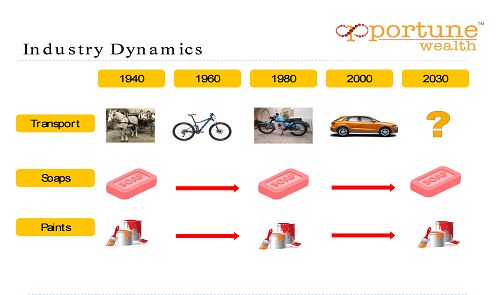
Instead, we look for industries that have low capex, high growth and strong cash flows. Some of these are financial services, segments of pharma, consumer, retail and technology. We look to avoid industries with high capex, slow growth and heavy asset requirements such as oil and gas, cement, power and automobiles.
Winning Companies are not just companies with good market share, but also those that have strong business moats and competitive advantages. We analyse industries based on Michael Porter’s Five Forces Analysis and try to predict how things will playout in the long run. This also gives us a sense of whether the company in question is following the correct strategy for future growth.
Sound Management: Once we have found a potential winner, we ensure management is not only doing what it says, but also working in the interest of minority shareholders. This includes taking decisions that benefit all shareholders.
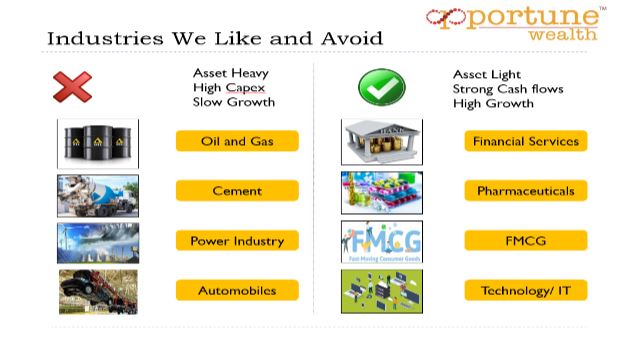
Reasonable Valuations means that we need to buy a company with the expectation that we are earning a 15%-18% growth in the coming five years, at the price which we enter at. We are essentially looking for companies which will double in share price and profits every five years.
With this overall philosophy in place, we believe we are well placed to keep investor capital safe, as well as grow it consistently.
In addition, we also ESG (Economic, Social and Governance) Standards of Investing — Many of our client have focused on ESG investing and we are looking to focus on that as well. ESG practices are still evolving. There is currently no standard score or framework to measure the ESG impact of companies in India. In future, should there be standard score metric – we would expect several of our companies to score high on these parameters.
Tough times don’t last but strong businesses do!
Our objective is to find companies where we see long term wealth creation opportunity and ride the wave along with our investors (as I personally invest in the same stocks as investors and so does Opportune Wealth as a company). I would like to reiterate: Focus on time in the market rather than timing the market. Invest in equities only if you have a 5-7 year long horizon to actually see the power of compounding in equities.
Amid all the noise around IPOs, inflation concerns and daily politics, we continue to stick with our action plans. As always, feel free to reach out with comments, suggestions on our business, investments. Do share our newsletter with your friends and family who may benefit.
In case you would like to set up an advisory meeting on your investments with us, please email us at clientrelations@opportunewealth.com
Zomato: Expecting Short-term Euphoria
IPO DETAILS
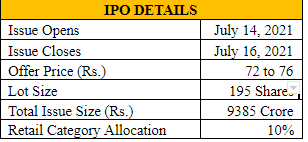
Industry
The food-tech industry has been a revelation across the globe in the last decade – identifying key pain points in the food ecosystem and changing the ways we consume food.
The opportunity size of this market in India is huge. The addressable food services market today is $65 bn which can grow to $110 bn by 2025, according to RedSeer. As compared to China and the USA, which are far more evolved markets, India has a huge runway for growth in this segment.

A high growth, large opportunity size industry does check our Industry box.
Company
Zomato’s plan is to create a food ecosystem. It has been able to put in place a unique 3-sided business model – Consumers —- Restaurants —- Logistics (Through Hyper pure)
To capture value out of the shift in customer behaviour, Zomato has two core business-to-customer (B2C) offerings –
(i) Food delivery and
(ii) Dining-out, in addition to our business-to-business (B2B) offering
(iii) Hyper pure. Another important part of our business is
(iv) Zomato Pro, the customer loyalty program which encompasses both food delivery and dining-out.
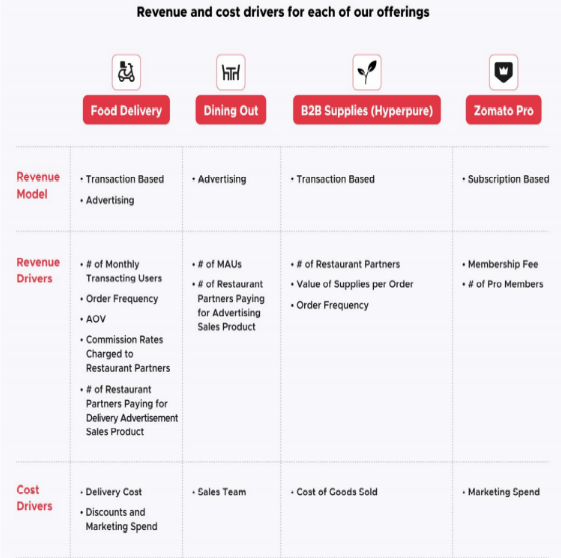
Zomato is now entering the grocery business which has completely different dynamics than restaurant food delivery. The purpose is different, the user base is different, the unit economics are different. Though, a high growth market, we are not really convinced if this was the right capital allocation strategy by the management.
FY21 has turned out to be a turning point for the company – with the company reporting profit at least on a per order basis. However, some of the drivers for improving unit economics do not look very sustainable in nature- the increasing cost per order for restaurant owners, low discounts, increasing delivery charges. How far can they stretch the restaurant owners, the consumers in charges and fees? This is one area where we will be keeping close tabs.
The unit economics are expected to improve going forward as well. With a higher scale, the operating leverage will kick in, in terms of delivery and marketing costs.
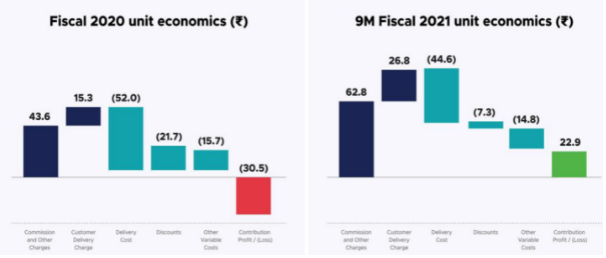
The J-Curve Effect is still far away
When it comes to tech companies, we have something called the J-curve effect that kicks in once the company has reached enough scale and become an important part of our lives. The real value starts coming in the form of cashflows once the company reaches the Irreversibility stage- where the business has developed significant moats.
Example: Zerodha’s Profits have soared from Rs. 18 crores in FY19 to Rs. 1000 crore in FY21. That’s the kind of cash flow goldmine, PE and VC investors are chasing with some of the new-age tech players.
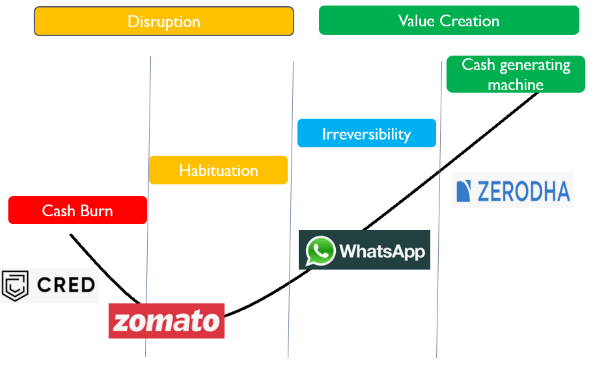
Zomato, in its current stage, is a high potential business with a lot of moving parts.
Zomato is becoming a household name. The business potential comes from the data that it has gathered from over 100 million users across the globe! Once, Zomato figures out a sustainable business model to leverage this kind of database, then there is a probability of hyper scale profits coming in.
It is still in the trial and error phase- whether it comes to trying out the online groceries or supplying raw materials to partner restaurants to improve relations with them.
Zomato has recorded a staggering revenue growth of 62% CAGR over FY18-FY21 despite FY21 being impacted by covid-19. We expected a CAGR of 36% CAGR growth to come in on top-line in the next 5 years.
Management
The Board of Directors of Zomato is very strong and professional with rich experience across business verticals. The management team is ambitious, to say the least. Deepinder Goyal – is the MD and CEO of Zomato has been in this industry for over 13 years which his when he founded Zomato.
Valuations
This is where Zomato is not fitting into our framework. At the IPO price of Rs. 76, it is being valued at 25x EV/Sales. The global peers are far larger in scale and some of the even profitable trade between 7-15 times EV/Sales.

We expect a decent 20-30% listing gains post which our risk-reward ratios are not favourable. Hence, our Recommendation is to subscribe for short term gains- though this will mean a high-risk trade. We are not recommending Zomato as an investment at these valuations.
However, Zomato will continue to be under our research coverage list and we will keep evaluating it as the business continues to evolve.
Disclaimers/ Disclosures:
- These are our internal notes, and not an indication of recommendation to Buy/ Sell these securities mentioned. Please do your own diligence before investing.
- Opportune Wealth clients and management are invested in these securities.
- We reserve the right to change our mind and sell these holdings at any time, and may not be in a position to advise non-clients if we do so.
Disclosures with advice
- The advisor has indirect exposure in the securities advised herein.
- The advisor has no connection or association of any sort with any issuer of products/ securities advised herein.
- The advisor has no actual or potential conflicts of interest arising from any connection to or association with any issuer of products/securities, including any material information or facts that might compromise its objectivity or independence in the carrying on of investment advisory services.
- Investment Advisor draws the client’s attention to the warnings, disclaimers in documents, advertising materials relating to an investment product/s that are being recommended to the client/s. A brief regarding the risk associated with the investment products are available in client agreement, same may be referred to before investing in advised products or securities.
Hope you and your family, neighborhood continue to stay well despite the ongoing pandemic.
It gives me immense pleasure to share a brief note on our five-year journey with you. As we embark to achieve greater milestones in the times to come, I also wanted to draw a line in the sand saying we will not be taking direct investment accounts of under Rs. 20 lakhs under management for a new client or a returning client starting 6 May 2021.
It gives me immense pleasure to share a brief note on our five-year journey with you. As we embark to achieve greater milestones in the times to come, I also wanted to draw a line in the sand saying we will not be taking direct investment accounts of under Rs. 20 lakhs under management for a new client or a returning client starting 6 May 2021.
The truth of the matter is that ours is a boutique business and we are looking to serve a handful of clients by advising them not just on equities but on all their investments. In our industry very few service providers try to go beyond the transaction. Our effort continues to be to give you market-beating returns at whichever time you enter the market. With your belief in our investment philosophy, we have been able to achieve it.
To raise the value proposition further, I look to continue to have quarterly one-on-one meetings to personally address each of the unique queries and get a deeper sense of your financial goals and requirements. We have also been trying to help clients on share transfers, death transfers, will writing on a pro bono / no charge basis as each of you is a friend, relative before you are a client. I consider it my duty to assist you in matters related to money.
I, therefore, urge you to keep the sanctity of our minimum investment criteria of Rs. 20 lakh per account. We look forward to doubling that for you in the coming years, and growing our fee-base over time as we make you our clients for life!
We understand our responsibility as a financial advisor and for those of you who are looking to invest small amounts, we are happy to share that we would soon be going live on the Smallcase platform and are currently in the development stage. Smallcase is a technology platform that enables retail investors gain access to investment advisors like us.
On our five year journey,
I can say that I started with zero employees and no office space. My commitment to my work though was the same. I had just begun investing for clients for a month when I delivered my daughter. I recall managing trades for clients over the phone, while still being in the hospital. Weeks later, demonetization had taken place and I was on top of the markets taking it as a buying opportunity. Minimum investment criteria back then was Rs. 1 lakh.
Fast forward two years later, I had 2 employees and a rented office space. With about 20 clients we raised the minimum investment criteria for new clients to Rs. 10 lakh. It was heart-warming to see the confidence of all our clients grow with us as we didn’t let go of any of our old clients.
Come year four, I had 4 employees and 2 interns. Costs had grown faster than revenues, unfortunately. The pandemic hit and it did impact us both financially and in terms of employees. We adapted quickly to these challenging times and moved our operations completely digital well before the lockdown was announced. And as we complete our 5 years, today we stand on a firm footing as for the first time we achieved profitability.
The pandemic has shown just how important financial planning is…and we continue to work towards it. At Opportune, we realize that financial prudence works in tandem with financial independence. During my conversations with a few young families who had home loans, car loans pending, I requested they close their account and pay off their loans first. Then return to me with a minimum of 20 lakhs. This was a tough conversation but an important one.
Looking forward, I hope to breathe life into your portfolio and illuminate all money matters to you through my expertise. I have a few large clients who are investment experts in their own right, and yet they have parked funds with Opportune Wealth. Having been in the business they realize the value of an expert’s advice. Just like a doctor when you are sick, a dietician when you need to lose weight, or a fitness trainer when you wish to look better.
For others who prefer to do the DIY – Do It Yourself – method. Perhaps we aren’t the right service providers for you. Mirroring our advice or looking for free advice on your larger portfolio holdings, that too reflects on your personal ethics and not on my ability to give you market-beating returns.
I look to keep adding value to you and your family beyond these returns. I would be happy to have more than one family member attend our quarterly meetings. Because when it comes to money matters, there are more misconceptions, myths, and mental models than there are to managing your weight!
I say this with authority and confidence as I’ve spent the last 7 months and over 150 hours studying the QPFP course – Qualified Personal Financial Planning course offered by Network FP Exchange.
As a valued partner in our growth, if you think my time and your returns are worth paying a fee for, please do refer your friends and family looking for an ethical, competent, and professional money manager.
Hoping to serve you and your family on all money matters for the next 30 years. As for 2021-22, the goal in this pandemic year is just staying alive.
Opportune Wealth: Follows ESG Investing as a Stated Principle
Today I wish to introduce the concept of ESG investing and state it as a rule at Opportune Wealth for our current and future investments.
What is ESG Investing?
ESG stands for ‘Environmental, Social and Governance’. ESG investing involves looking at these three parameters in addition to the business and financial metrics while making an investment decision.
Factors considered in each of these parameters are detailed here: ESG investing involves researching and factoring in environmental issues such as companies not involved in tobacco-related businesses, management tries to reduce carbon footprint, and use renewable energy where possible. For social factors it includes companies that think of customer and employee satisfaction alongside profits, social impact of its business on communities. While governance issues means that the company treats minority shareholders at par with promoters in taking decisions, executive compensation is not exorbitant, among other things.
Why ESG Investing is a principle we are stating at Opportune Wealth?
At the heart of ESG Investing is a simple idea that companies that are ESG compliant are more likely to succeed in the long run and deliver stronger returns, while creating value for all their stakeholders (customers, employees, environment and shareholders –yes, You).
Your Opportune Wealth portfolio companies are already ESG compliant, however, by stating it as an intent and principle today, we are further raising the bar to include future companies that also meet our minimum threshold.
We believe that companies with strong ESG practices score high in terms of reputation and carry lower risk because they incorporate sustainability as a core value. This translates into steady and sustainable performance for the business. It is known that ESG Complaint companies to have lower incidences of controversies, occupational mishaps and a deeper connection with the employees, customer and society at large, all of which will create incremental value in the long run.
Internally too, we are trying our best to be more and more ESG compliant within Opportune Wealth – by making you a stakeholder in our business and reducing fees as we reach profitability per account; sending digital reports vs. print outs, aligning personal portfolios of directors to those of clients, and doing things right by improving overall employee satisfaction/ support in these covid times. If you have more suggestions on this front, I’m always here to listen!
If you don’t already know, I plan to run Opportune Wealth for the next 30 years or more…I suppose that’s a long enough time to have an impact on a customer/community. I look forward to hearing from you and working closely with you and your family on this intent in the coming years.
12th March, 2020
Opportune Wealth: We remain calm and continue to stay invested in the face of fear
Dear Investor,
Markets have corrected quite sharply over the last month since the Coronavirus fears emerged. Nobody knows how long this will last, markets could move up overnight — the day a pharmaceutical company releases the news that it has an antidote, OR if number of new cases fall substantially.
We are therefore remaining calm and continue to stay invested. I would urge all of you to do the same.
Sensex is at the same level as it was two years ago – but this is temporary. Markets behave in extremes when there is Greed and Fear. As a professional managing your money, it is my duty to let you know that markets are at an extreme currently and this won’t last forever.
Your money continues to be invested in good companies, the fortunes of which do not change with this Coronavirus. I anticipate that once market sentiment reverses all these companies will once again be trading in the green and you will not be in the red.
Over the long-term, businesses continue to be resilient and when normalcy prevails again, markets and your portfolio will bounce back. A simple graphic representation of how markets recover after a crisis is below for your reference. Though 2020 has started on a negative note, and March-quarter-end statements to you may look dismal. Don’t be surprised if by the end of the year in December 2020 or soon thereafter – we are sitting on the maximum gains for the year. As the attached letter by Howard Marks of Oaktree Capital suggests, things could get worse from here or better – ‘nobody knows’– but it may not be a
bad time to put some money to work if you have cash.
I continue to remain optimistic in the face of fear. I sincerely believe and have faith in humanity to resolve the current situation at hand. I also have faith in equity markets to be irrational in the short run but remain logical in the long-term.
We continue to watch developments at our companies and the macro-environment carefully. We understand that the capital you have put in equities is long-term oriented, meaning with a minimum 5 year horizon in mind. Therefore, we suggest remaining invested and reaping long-term benefits. In fact, should you have any spare capital at hand – this is the time to
sum-up-the-courage and invest in equities!
Should you have any questions or concerns, please don’t hesitate to reach out to me directly.
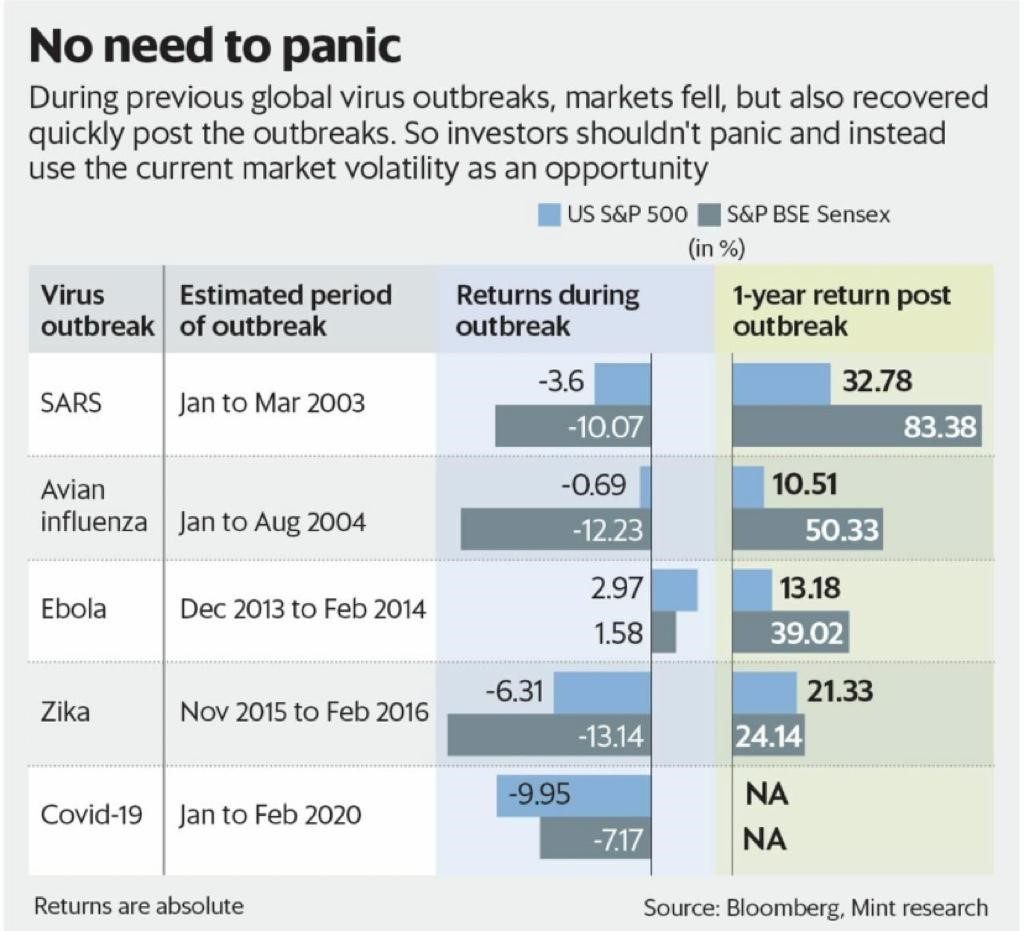
Regards,
Suruchi Jain
Principal Officer, Opportune Wealth Advisors Private Limited
SEBI Registered Investment Advisers Registration No. INA000005366
24th February 2019
Opportune Wealth: Quarterly Newsletter V
Dear Investor,
Hope you had a restful Sunday!
Our portfolio has been doing well and rising with other large-cap stocks in the BSE Sensex. No one can say how long this uptrend will continue, however, there are a few bumper years in stock markets when you can make 20% plus returns in a single year and this seems like one of them.
Our portfolio in the nine-months from 1 April 2019 to 31 December 2019 is already up 15%. Do note that these are unrealized gains and taking two specific points in time, the final number you see on 31 March 2020 may be quite different.
Also you will not see these in actual returns or in your tax filings as well, unless we were to actually sell all your stocks. This is unfortunately the nature of long-term stock-market investing – unless you SELL you don’t generate any cash flows. Unlike a fixed deposit investment where you can pay yourself quarterly dividends, or a dividend-yielding debt mutual fund investment. Several of the Quality Companies we hold in our portfolio only pay out 1% of price paid as dividends, and this is the only cash-flow coming to your account per year vs. the 2.5% fees you are paying us for our advice. This can sometimes make you feel short-changed if you only look at cash in and cash out. The key though is to see wealth being created as ‘unrealized gains’ over time. It’s true that you may have to pay Long-term- capital-gains tax on most of your investments when you sell… However, for most of our clients who have been with us for over 1 year: pre-tax post-fees and expenses returns generated by Opportune Wealth have most definitely been above current maximum pre-tax fixed deposit (FD) returns of 6.9%. The current FD rates for HDFC bank are listed below, and the best rates they give to senior citizens is mentioned as 6.9% in the table. Post-tax the difference between Opportune Wealth returns and FD returns become even starker, as FD would be taxed at 30% and Opportune portfolio at 10% LTCG. Since our average holding period for stocks currently is 2.2 years, of the 3.4 years since we began investing. Which means we have held on to most of our first purchases from the beginning of time.
Couple of other updates on Opportune Wealth:
- All client portfolios are now 100% allocated. We will be keeping at most 3-5% cash in each portfolio to settle any minor trade imbalances. I believe this is the best strategy given that markets move up or down suddenly and we don’t want to miss out on the upside.
- I am now investing alongside all of you. My husband moved jobs in mid- September 2019 and currently we have no trade restrictions on our personal accounts. As a result, I have been able to re-allocate my personal portfolio to hold the exact same stocks that I am recommending to all of you. My future returns are tied to the same stocks as Opportune Wealth clients.
- You are in 100% control of your Opportune Wealth account. Some of our clients feel that they cannot control buy/sell trades and holdings in their demat account opened under advisory services of Opportune Wealth. This is not the case. You have full access to all the information about your account through the demat account web-portal and mobile application. You only need your registered email/ phone or client code to log in. I will be sending a separate email with detailed screenshots of how you can access the same information we send you, on a real-time basis at your finger-tips.
Until next time, let’s hope the markets and our portfolio continues to move in a positive direction.
Regards,
Suruchi Jain
Principal Officer, Opportune Wealth Advisors Private Limited
SEBI Registered Investment Advisers Registration No. INA000005366
8th December 2017
Subject: TO TAKE CASH CALLS OR NOT ? – That is the question!
Dear Investor,
We have been watching market developments carefully and find that there may be volatility ahead. There could potentially be a wide correction or downfall in the coming weeks, months or a year. From our historic analysis markets typically go through cycles of peaks and troughs every five to seven years. Also, if you continue to stay invested across cycles for over eight years in equity markets, then the probability of loss is greatly reduced. Below is loss frequency and returns data for different types of mutual fund investments over long periods of time.

The markets have risen quite a bit already, and we are sitting with substantial gains across most of our client portfolios. However, given the volatile and ever-changing nature of equity markets, we wish to take a cautious approach and propose two options for each investor.
In the first option, we would actively begin to sell some positions to curtail the downfall in the event of a market slump. This would mean lower volatility in your portfolio, however, we cannot assure no losses or better returns. In this market-timing strategy we would ‘hope’ to redeploy once the markets are in recovery phase once again, but there is no surety of better outcomes. In the bargain of wait-and-watch we may miss other opportunities or not get the timing quite right.
In the second option, we would continue to stay invested fully and deploy more capital as well when the opportunities present themselves. However, you may face strong volatility over time in line with the markets, and may also temporarily / notionally lose your initial capital.This has happened in the past for several market players. As our chart of the BSE Sensex 100 shows, there are steep dips in the market with certain events but there is also a strong recovery over time. In the 18 years represented here, the markets went up 13x between 1999 to 2017 and rose at an average of 15%, however that move was clearly not a linear one. Like most long-term goals, despite short-term setbacks one can count on getting reasonable returns over 10, 15 and 20 year horizons.
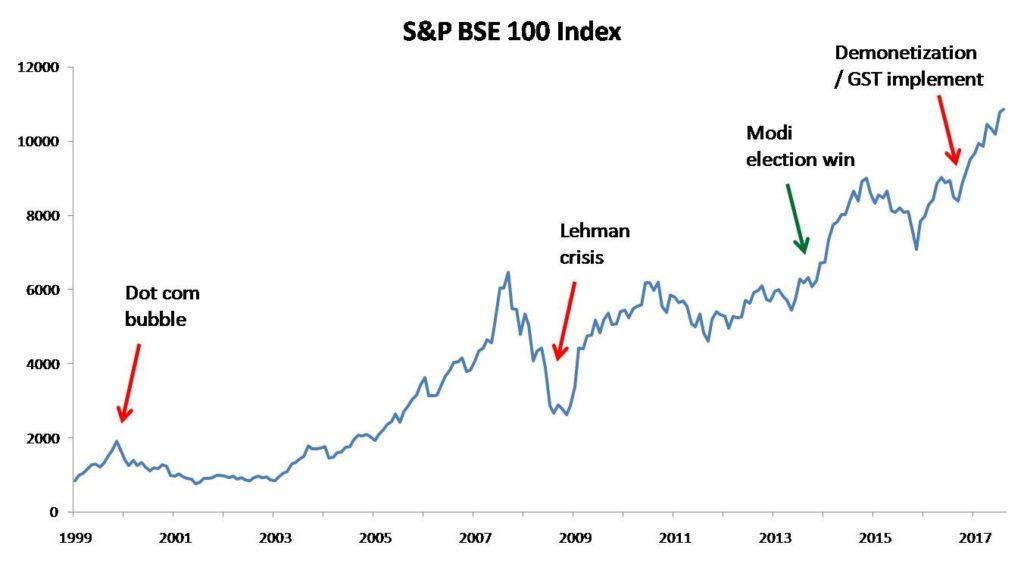
All of you have in your initial risk profile mentioned that you do not need this capital for the next five years but may need it in 10 years. We are also cognizant of the fact that several of you are investing for the very first time in the equity markets. We would like you to continue having faith in long term capital appreciation despite short-term bumps. However, since our job is to advise you on what is best. We would like you to take the final call.
Please choose how you would like us to model your portfolio of the two options:
- Take cash calls — Protect my downside and preserve my capital. I may need this capital in less than 10 years.
- Don’t take cash calls, Stay invested 100%– Let’s swing for the fences and take a hit to capital in the medium term if we have to. I will not need this capital for the next 10 years or more.
Regards,
Suruchi Jain
Principal Officer, Opportune Wealth Advisors Private Limited
SEBI Registered Investment Advisers Registration No. INA000005366
